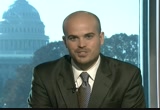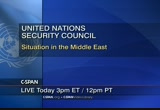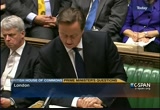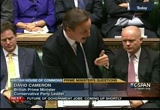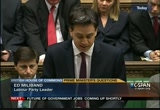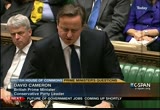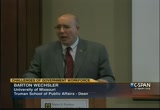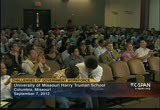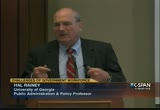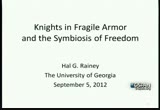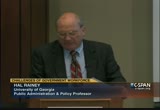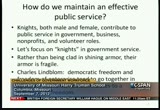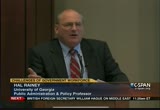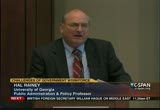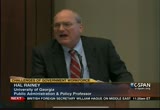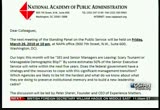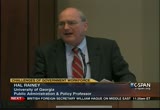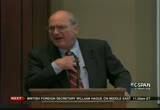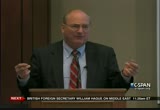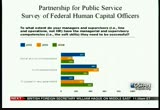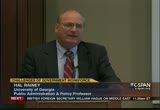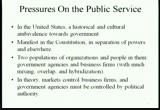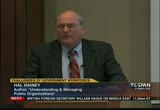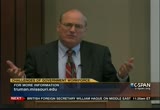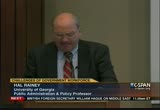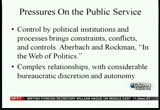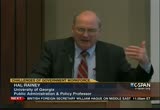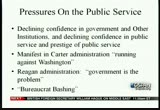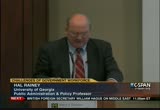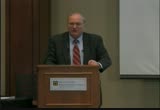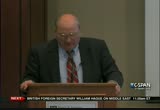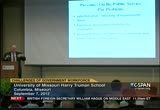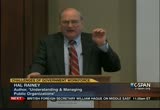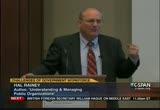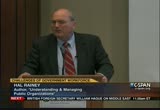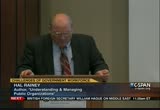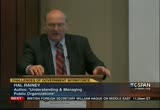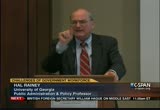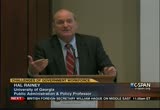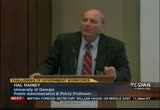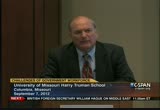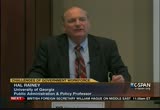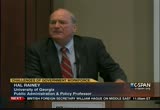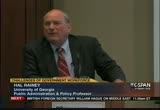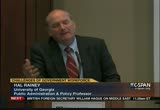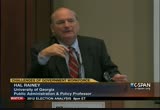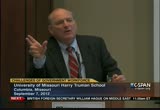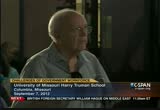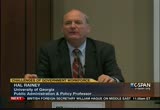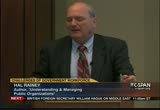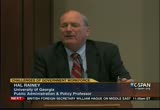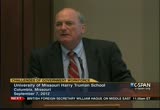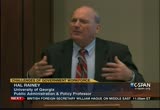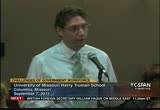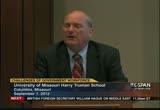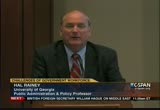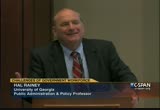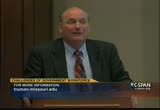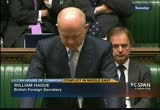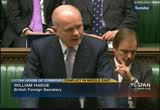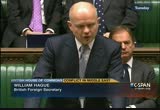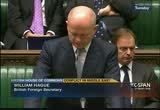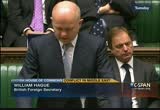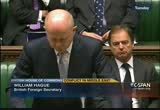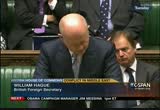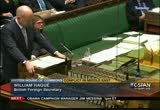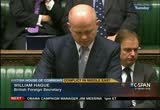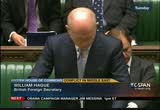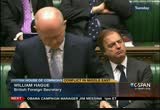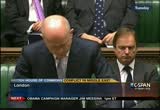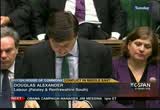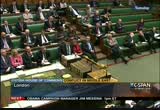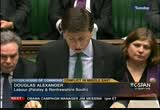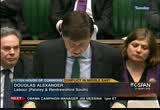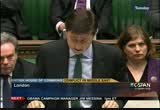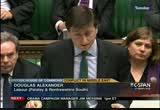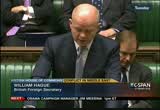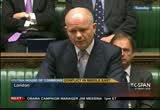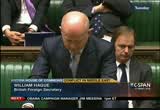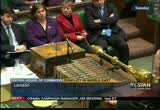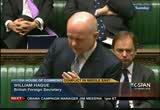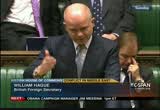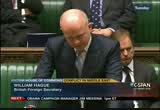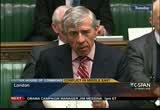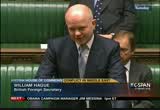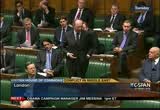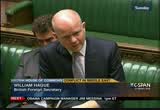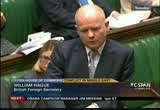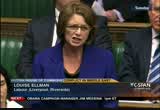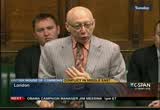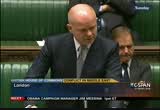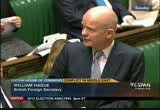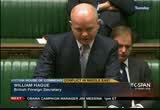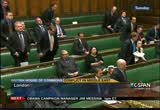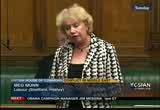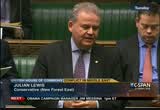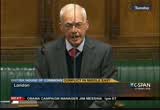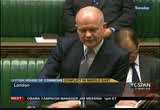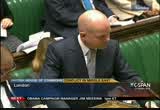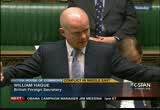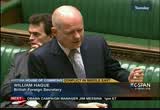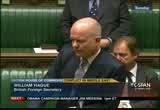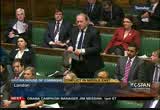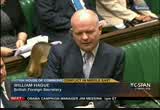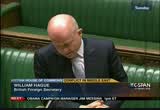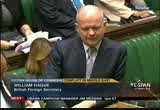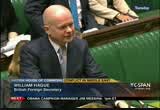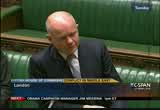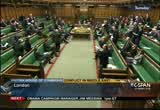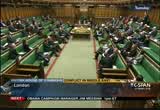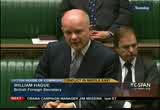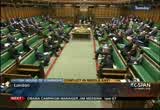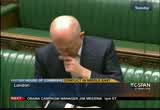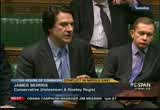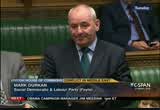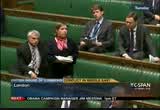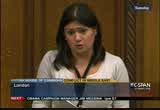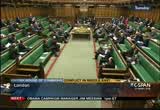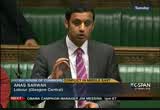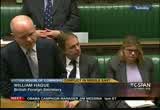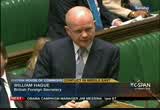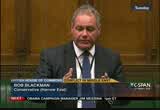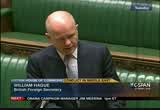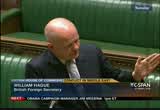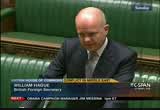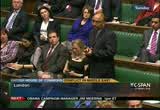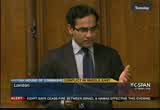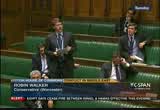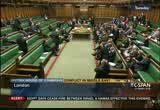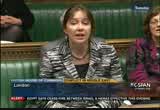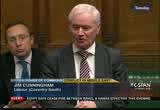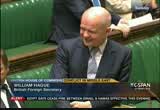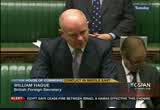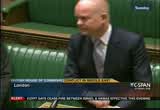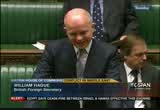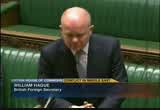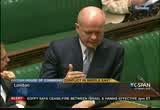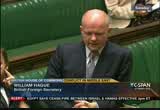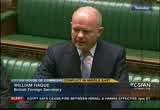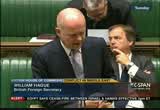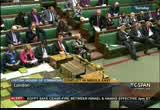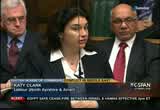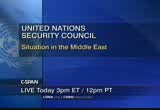tv Public Affairs CSPAN November 21, 2012 10:00am-1:00pm EST
10:00 am
thank you for being here. guest: thank you very much. host: that will do it for our show today on "washington journal." we will see you here tomorrow, 7:00 a.m., thanksgiving day, for more "washington journal." ♪ [captioning performed by national captioning institute] [captions copyright national cable satellite corp. 2012] >> taking a look and our programming schedule, join us at 2:00 eastern for a look at retirement issues and the baby boomer generation. after the program, we'll open up the phone lines to get your opinion on the topic. at 3:00, the united nations security council is meeting today to discuss the situation
10:01 am
with israel and hamas and the gaza strip. we will have that for you live. the conflict in israel and gaza came up today during prime minister's question time in london. >> can i start by going the prime minister in paying tribute to capt. area of the royal regiment of scotland? he showed the utmost courage and bravery and all of our thoughts and condolences are with his family and friends. can i also express my deep sorrow about the loss of life and suffering in israel and gaza in recent days, including the latest terrorist attack on a bus in tel aviv. there is widespread support on all sides of the house for immediate and durable ceasefire being agreed in israel and gaza. so what will the prime minister set out in his view what are the remaining barriers to this cease-fire agreement being reached? >> i agree with the gentlemen about the appalling news this
10:02 am
morning about the terrorist attack on a bus in tel aviv. can i also express our concern for the people in southern israel and for the grave loss of life in gaza. i think all of us, across the european union, including also america and beyond, need to be putting pressure on israeli prime minister and on all those that have contactto with hamas o stop the fighting, stop the bombing, and that is exactly what i have done. over the weekend, i spoke twice to the israeli prime minister, once with the president of israel. my partners are also working very hard to persuade both sides that we need a cease-fire. beyond that, with a proper discussion on the future of israel and palestine in them he is right to say any such cease- fire deal can be turned into
10:03 am
permanent peace if there are a meeting for resumption of negotiations towards a two-state solution. this has shown us again there is once with the president of israel. no peace nor a peace process. the international community had done their responsibility for the abject failure of having a meaningful negotiations nine years on from the promise of the road map for peace. can he therefor set out to the house what beyond the hopes for a cease-fire in the to be taken to pressure both sides into meaningful negotiation? >> first of all, let me agree that we need a process to be put in place and i think we need to do everything we can to persuade president obama that this should be a leading priority for a second presidential term, but i would make the point that while we all want this process and this piece, in the end, only peace can come about by israelis
10:04 am
and palestinians sitting down through the issues. they have to discuss borders, refugees. president obama has said, and i wouldthe international agree, ws more than they want it. we have to encourage them, provide the framework, push for a process, but in the end, when the courageous leadership. >> mr. speaker, that is completely right, but we need to use every means at our disposal to pressure both sides into those negotiations. the reality is, the confidence that there can be a two state solution is dwindling month by month. there is an opportunity for an accord of a two-state solution at the general assembly next month. we on this side are supporters of this because we believe it will strengthen the moderate voices among the palestinians who want to pursue the path of politics and not that of violence. could i urge the prime minister
10:05 am
to consider adopting this position in the days ahead? >> first of all, let me agree with him on the first part of what he said, which is that confidence is dwindling, and there is time left for a two state solution. that is why there is a sense of urgency with the international community. the facts on the ground are changing. frankly, it is so much in israel's interest right now to push for the two-state solution. on the potential for a vote at the united nations, it is our view that the palestinians should not take this to the un in the short term. we have our urge them not to do that. clearly, if they do so, we will have to consider the right way to vote. in the end, we will not solve this problem at the united nations. this problem will be solved by israelis and palestinians sitting down and negotiating, and there may be dangerous from
10:06 am
pushing it too early at the un, in terms of a cutoff of funds for the palestinian authority, and all the other consequences that could follow. let's get negotiations going. >> we expect to hear more about the situation in the middle east, in particular, israel and gaza, when the un dangerous from pushing it too early at the un, in terms of a cutoff of>> you cy council meets. officers changed the army so that it is a long- term army purify your shoulders -- soldiers in the labor market. over five years we created an absolutely splendid force of young men and women who were willing to serve their country as volunteers, and they had the same tradition and same culture, the same loyalty and dedication as any other dedicate --
10:07 am
generation of americans that came before. they prove themselves in the gulf war and panama invasion and prove themselves in the last 10 years in iraq and afghanistan. but the theme we have to keep in mind is something that president clinton serve their country as said in his second inaugural address, -- lincoln said in his second inaugural address. to care for those in battle. never forget that they are carrying the american spirit, that they carry the american traditions with them. when they get injured or hurt or when they just come back to be reintegrated into society, we have to be waiting to care for them, not just the federal government or the veterans administration, but their fellow citizens. >> more about the treatment of returning veterans with colin powell and stan mcchrystal. just after 9:30, leaders in the film and music industries talk about hollywood's impact on american culture. later, space pioneers and nasa officials pay homage to the first man to walk on the moon, neil armstrong.
10:08 am
>> now to a discussion on the challenges, opportunities, and threats facing the u.s. government work force. university of georgia professor hal rainey recently spoke to students at the university of missouri school of public affairs. his speech is one hour and 10 minutes. ?wçññ >> good afternoon. good afternoon, dean of the truman school of public affairs here at the university of missouri. it is my pleasure to welcome you to the monroe -- monroe-paine distinguished lecture series. our speaker today it is
10:09 am
professor hal rainey, the alumni distinguished prof. of public administration at the diversity of georgia. as i said to a group earlier this morning, he is a longtime friend and colleague of mine. we taught statistics back before pi was squared. [laughter] his lecture to they will talk about the issues we confront in the public service, challenges, opportunities, as well as some of the threats facing the public service. please join me in welcoming professor hal rainey.
10:10 am
[applause] >> thank you. i am enthusiastic about being here, a great honor and pleasure to be here at the internationally respected truman school and to meet some old friends and colleagues whom i have barely four years and to meet faculty members here who are well known nationally, whose work i know and admire very much. i had opportunities to spend some time with students with whom i am very impressed to have in your program so i am enthusiastic to be here. if i do not seem so and i seem bent over and weary, it is because i have enough microphones on here to feel like
10:11 am
a pack animal. there is one microphone for c- span, another for the feed here. i will do my best to carry this week. it is nice to see some people in the front. i was reminded, as the audience was coming up, i was at a church with a new, a visiting minister. i am glad that so many of you got here early to get a good seat in the back. [laughter] i want to talk about the title that has been advertised in the publicity about this event, " knights in fragile armor: the crucial but threatened character of public and governmental service in the united states." in my efforts to devise a catchy title, i have added this symbiosis of freedom reference that i will mention to you.
10:12 am
perhaps the term knights is not an adequate metaphor, but one of the themes in my career has been that we have good people providing public services in the united states and other nations, in many ways. i construe public service very broadly. we have a huge population of non organizations. but i want to focus on individuals in government service, in particular today, because there has been a great concern over the last 30 years in my field of public administration about the declining prestige of government service, pressures on its common
10:13 am
challenges to the public service, government service, but we are concerned about. i wanted to talk about some of those challenges today. the idea of frontal armor, -- fragile armor, these knights are, in various ways, under pressure that is making it harder to keep good people in the public service. i am not going to offer a lot of solutions to the challenges faced but i want to pose to you a member of the challenges we all face in a sense because of the crucial nature of government service that i will proclaim here. other people, like other political groups, have pointed out that democratic freedom,
10:14 am
freedom in politics, personal life, in nation states around the world, they have gone with freedom of enterprise. they tend to go together. hence my effort to coin the term the symbiosis of freedom. good government is beneficial to business and business is necessary to good government. of course, the relationship between business and government has been tremendously contentious over the years, a source of great controversy, but i would argue the two elements are necessary. that is why an effective public service is necessary and we have to consider fundamental challenges we face as a nation in how we maintain an effective government service. earlier today when i met with the students, i was talking about a federal geologist i know.
10:15 am
this team of bureaucrats went to afghanistan to locate large supplies of precious minerals, are rare and valuable, in the soil in afghanistan. the geologist and i know was awarded with the highest civilian award that the afghan government awards because they were so grateful for these discoveries. i showed them to a scientific american article, about this development. one of the problems, however, is that the afghans do not have what we and the number of other nations have. they need stronger credit institutions, a more effective, non-corrupt government, and they need is this institution working together, collaborating to take advantage of these resources so that they can move away from reliance on growing poppy to contributing to the
10:16 am
international opium trade. one, this geologist is not some stereotypical government bureaucrat in washington shuffling papers. he is out risking his life literally in afghanistan wearing a helmet and flak jackets and under considerable threat. but these federal bureaucrat but their job, something very creative, and hopefully helpful to progress in the human race. collaborations between government and business, government and the private sector, in certain instances, have been the source of major innovations and development in contemporary life, to wit, the development of the internet. that could be large to characterize as a joint activity
10:17 am
of government and private-sector actors. space travel. the military power of the united states. the national highway system. all involve this symbiosis of public and private contributors. but my concern is we need to keepof government and private-sr up the public side of this equation. here are some of the concerns that people in public administration have been wearing about for some time now. the couple of years ago, this announcement came to me because i am a fellow of the national academy of public administration. the national academy is a congressionally-mandated academy or association of people, government officials, academics, and others, who are called upon in various ways to analyze for the federal government, federal agencies, and other entities of government. they were conducting a discussion, described in the many senior
10:18 am
managers are leaving. is this a scary tsunami, or is it manageable? the senior executive service is a top category of federal career officials, career employees, at executive levels in their career. there are about 8000 of them. we baby boomers, of which i am a part, are getting to the time where we will be retiring. this is a national and international phenomenon. there are a lot of managers and executive leaders who are lining up to retire. who replaces them? that is a lot of people leaving. certain critics of government will argue, so what? let them go. they are just federal bureaucrats. in fact, i talked about a newspaper, which i'm not name, that said that to that effect. this is a chance to get rid of
10:19 am
the dead wood. i cannot go through all that right now, but i can tell you, a great number of those people are discharging major responsibilities and doing work, like our federal geologist, that is very now able to the nation and world. if we lose this institutional knowledge, this professional talent, how are we going to replace it? that is a big question for us. here is another indicator of concern. the partnership for public service -- sorry, i do not like power point that much. i would have a hard time explaining this to you verbally. you may not able to see this very well, but that is ok with me, because i will offer my
10:20 am
interpretation of them. if you cannot see them, you cannot argue with my interpretation. [laughter] the partnership for public service was founded as a nonprofit organization tried to promote the public service to young people in various ways and trying to recognize excellence in public service. it was founded with a large donation by a business man who had been very successful after early in his career being a federal employee. he was very concerned about the apparent decline of prestige and governmental service and wanted to do something to address that problem because he thought, actually, his governmental service was one of the most interesting and important parts of his career. and they have done surveys of human capital officers in the federal government. human capital officers is a
10:21 am
nother term for human resources personnel. they said, to what extent do your managers and supervisors in your organization have the managerial and supervisory competencies' they need? represents green bar the responses in 2008. in two dozen eight, 44% of these human capital officers said our managers have good skills. they have the skills they need. the top reflects the answers to the question, not at all, or to a limited extent -- the managerial skills they need. in 2012, the results have
10:22 am
reversed. 18% say we have the managerial skills we need to a great extent. 33% at the top here say not at all or to a limited extent. we all need to be careful or skeptical in interpreting survey data. we do not know exactly what this means. but one disturbing implication is that there is a fairly rapid decline in managerial skill in federal agencies. i cannot go through it now but i could make the case that a lot of these agencies and people we are discharging have important responsibilities that affect the lives of many americans. we need talent in those positions. so what i want to do is talk about a number of challenges we face as a nation in trying to encourage and develop a very
10:23 am
effective and maintain an effective government service, and not to present this to you as a sermon about the inability of public-service and how we all have to jump in and be governmental servants ourselves. but to talk about the situation as a nioand how to maintain the service. conflicts in our history as to how we regard government and people that work for government. there are certain fundamental issues we have to face, and i would like to talk about those. i will not offer wonderful solutions, but i want to raise public awareness and public participation in considering these issues, challenges we face. they are also very interesting and analytically as to why they are there and how they exist. starting with the big picture view, as many of you know, in the united states, we have a
10:24 am
cultural ambivalence toward government. we feel two ways about government. it is one of the ironies of our nation. some of the great contributions of the people of the nine states to world culture have been through government. at the same time, we are one of the most skeptical nations in the world about the power of government. this is reflected in the u.s. constitution, amongst other places come in the separation of powers. the federalist papers describe the separation of powers as necessary because we had to set ambitions against ambition. we did not want to put too much power in the hands of one governmental institution or entity, so we separated them, so the conflict and compete in various ways. the president and congress have to conflict in certain ways, calabria in certain ways, and powers are distributed. this has worked in a lot of ways, but for people in public
10:25 am
service, note that it sets up multiple masters, multiple bosses, and complicates their work in certain ways. it leads to other kinds of differences, too. by specialization is the study of organizations and the management and the people in them. from that perspective, i look organizations in the united states and i see two broad populations of organizations. one that can be categorized as government agencies, another that can be categorized as business firms. that may seem like a simple and obvious distinction to you, but among people that study organizations, that is considered a gross oversimplification. why? many of you know why. there are a lot of nonprofit firms out there that do not fit neatly into one of those categories. also, the public and private sectors, as i indicated earlier, are all mixed together and blurred in various ways. they share responsibilities.
10:26 am
there has been a huge increase in federal contracting and contract and at other levels of government with private-sector, nonprofit sector to carry off government possibilities, but i still argue we have these categories. in theory, markets control business organizations. they have to do things people want to buy, they have to make things people want to buy. in broad theory, this makes them do what consumers want, and in a sense, hold them accountable. the government has no such mechanism. government organizations typically do not make and sell things. so how do we control them? they have to be controlled through political authority. we have to set government organizations under the authority of politically- constituted institutions like, in our case, the chief executive officer of the president of the governor, or the legislative
10:27 am
branch in the courts. this seems simple enough but i would argue these are fundamentally distinct control processes that lead to some of the complications of one to talk about. when we control things through governmental authority, we control organizations through constraints, impose on them complex, basically, impose a budget rules on them. here is what you have to do. -- bunch of rules on them. that term there, control, in the third line, should be criticism. it must make you feel pleased to come today to obtain this insight. controlled by political institutions lead to control. are you glad you came?
10:28 am
that should be criticism. the point i've tried to mitt, ultimately, we have to control government through criticisms. if a government agency is doing something wrong, how is that correct? i once studied a major change they made in the social security administration, in thegovernmen. way they handled claims that come in pens because they have a backlog of and million people out there waiting for their social security payments and waiting too long for them. they made a very innovative manager of change to wipe out the backlog, but how do you think it came onto the public agenda and they came under pressure to make the change? if you are a retiree in peoria, ill., and you do not have a job to go to and are not getting your check, what do you do? of course, you call your congressman, or you complain. for people'sa perfectly legitimate
10:29 am
complaint. ? if you are a retiree inbut thend to be registered in to the public system. part of the problem that that creates for us is that we constantly need to criticize government. it is inherent in the way we live. the media has to bring criticism against the government for their shortcomings. the problem we have with public- service, at least some of us feel, the pattern of complaints and criticisms go too far or give the general impression of a government that is constantly malfunctioning and people in it that are constantly malfunctioning, and that these are inaccurate messages going out, but they had an effect. to be registered in to the public system. i will talk more about that. in recent decades, there has been coming in general, a decline in confidence in government institutions and other organizations. this confidence of declining confidence was not merely
10:30 am
focused on government. all institutions suffered a decline in public confidence in them. government was part of the focus. when jimmy carter carter from ga ran for president, campaigning against washington in a sense. he was an outsider that would go to washington to fix that place up there. then the reagan administration, even more aggressive about claiming the government was the problem. we need to curtail and restrict government authority. i feel that is when he turned bureaucrat bashing was termed. people were complaining about the federal bureaucrats and government and how they were not doing things right. some of those criticisms were
10:31 am
probably valid -- i am not trying to argue that any ideological orientation, such as president of those criticisms we probably valid -- i am not trying to reagan's, calling for the reduction of government, is necessarily wrong. we all want government to be efficient, as restrictive as we can get it, we have to pay for it after all. something about taxes -- taxes are extracted. usually paid voluntarily. that is an oversimplification. actually, officials at the irs will tell you well over 90% of individual taxpayers governments necessarily wrong. we all want government voluntarily and responsibly comply with tax laws. there is plenty of tax evasion out there, but most americans fulfill their responsibilities, but taxes are extracted. we have to pay for government. we, in public administration, believe in good government. the problem is, how do we maintain it would we have to
10:32 am
criticize it all the time? how do we maintain the good parts of it? the other contribution to the decline in the prestige reagan , even of government included pro-market anti-government. by economists which were very prominent academically. reaganomics was, in a sense, invented on university campuses. the media describe themselves as a watchdog, quite appropriately. it is essential we have an aggressive news media that hold the government and other entities accountable. if they are doing things wrong, we want them to report and criticizing it -- criticized it. however, what are the limits on the process? political scientists have done studies in recent decades in which they have analyzed media coverage and pointed out that media coverage of politics and government have become increasingly negative over the past several decades to where
10:33 am
sometimes the criticism is not balanced at all by the good news we could get about government. i could show you many examples of highly effective performance by government at all levels. we all know about some of the problems. what we do not often hear about are the successes, but the one i mentioned in the social security in administration. go to your average media outlet and say, don't you want to broadcast this story about the successful management of the claims processing procedures in the social security administration? can you imagine their response? who is going to read that, who is going to listen to that? there have been commissions concerned with this decline of prestige of governmental service. i mentioned the partnership with public service. paul volcker, the head of the federal reserve during the
10:34 am
carter and reagan administrations, has given a great deal of credit for very successful discharge of those responsibilities, led a commission dedicated to examining the decline of prestige and public service, and in their words, revitalizing public service. among their concerns, they found in surveys with federal government managers and executives, many of them said they would not recommend governmental service to their children. they also found a lot of college students were expressing a lack of attraction to governmental service. were not very interested in it. they sought it unfavorably. -- saw it unfavorably. so embedded in our culture is
10:35 am
criticism of government, so how do we keep that in perspective and keep it from damaging the people in government and organizations that serve us? i do not have a perfect example, solution, but i have a few suggestions. let me talk about some other pressures. here i go again trying to introduce a catchy phrase. competing crises make management go missing. one of the concerns we have in public administration is a lot of public officials and others in the united states do not to a governmental management very seriously. it is not something they can get much political profit out of it if you are an elected public official. if you go back to your constituency and say i have sponsored legislation that has improved the evaluation system for federal servants, how many
10:36 am
people would be energized by that? i was on a task force on this topic, in a sense, the future of the public service, with senators and congressmen at the federal level. one congressman that i spoke to who was known as one of the ones that were concerned with civil servants, with a proper and effective management of governmental activities. he had been a local level official and was very interested in trying to make his local government very well managed. he sponsored legislation at the federal level to try to improve management in federal operations, support good management. at one point, i asked him, how many congressmen and senators are there that share your commitment to this, are willing to invest to improve management
10:37 am
in the federal service? he said, about 10 people that really wanted to help and invest in this. why? people do not get much support for government. there is another problem that is very contemporary, that has been very controversial recently. a one author from harvard refers to it as the wording of groundwork. the lower end of the pay scale, the higher and are working towards each other. government executives do not get paid anything near the level of private-sector executives are paid. the lower levels of government, however, are doing somewhat better, according to analysts,
10:38 am
compared with lower lows of the private sector. for example, they get very good benefits. why does this cause problems? well, we are basically telling government executives that you are, in financial terms, not worth anything near the value of private sector executives. in 2011, the chief financial officer at one of the major american corporations -- not the chief executive officer -- made $60 million in one year. father executives in the corporation made 20, $30 million a year. the president of the united states makes $400,000 a year as the highest-paid federal official. other department heads, supreme court justices and others make less than that. so what we are saying as a
10:39 am
society is that government officials' salary amounts to a rounding error compared to private sector compensation. one of the concerns this raises is, does this ultimately drain government of talent, the people will go to work in the private sector because the compensation levels are so much higher? you can hope that we will have public servants who will say, as many of them do, i like working for government because i'm doing something important, the label. i do it right, it will help people. but if they tell you, you cannot afford tuition for your children to go to an elite college while private-sector executives can do that easily, you are asking government officials to work at a greater disadvantage to people in the private sector. the other end of the scale, you
10:40 am
should have noticed, if you watch the news or read the papers, has become controversial. donahue predicted this. he said these expensive benefits for government employees are going to be controversial because they are costing a lot of money. opponents of government will attack them. events recently in wisconsin and other states where there has been intense conflicts, even an effort to recall the governor of wisconsin, reflects some of this controversy over whether we can maintain these high level benefits. let me show you something else that is based on our search that most people would not expect to be covered but an example of some of the complexity in try to interpret the conditions i am talking about that great difficulties for government
10:41 am
service. you cannot see this one very well either, so i get to tell you what it says. actually, what this reflects is that i, and other researchers, were interested in the difference between government and business, have for decades, been conducting surveys of managers in business and government, asking them how they perceive their working conditions and other questions. what this reflects -- the analysis is very complex, actually -- but the results when we ask two relatively simple questions. one is, if a person is a poor performer, roles in my organization make it hard for me to remove them. in other words, is it hard to fire two relatively a poor perf? what indicate is that the government managers are much more likely to say yes, it is hard. business managers are much more
10:42 am
likely to say, no, it is not hard. the second question is, pay structures and rules make it harder to reward. in other birds, kenya reward someone with higher pay? government respondents would say it is difficult to do that. private sector respondents are much more likely to say it is not so difficult, we are able to do that. structures and rules make it harder to reward. in other birds, kenya reward someone with higher pay? government respondents would say it is difficult to do that. private sector respondents are much more likely to say it is not so difficult,these include f government to nonprofit organizations as well. these can be pretty big differences these results. in two different surveys, we found 80% or more, 90% of governmental response say it is hard to remove a poor performer and it is hard to raise the pay of a good performer, while the private sector respondents are down around 30%, an agreement
10:43 am
with those responses. whether it is true or not, those in executive positions in the government say it is difficult to fire. now, they are in different geographical areas, they include different levels of government, a different types of business organizations, but still, are the valid findings? we did not know, they are perceptions. maybe government managers share some kind of myth, but it looks like there is some concern about the personal systems. federal government agencies, like the u.s. office of personnel management, the major personnel agency in federal government, are conducting huge surveys of federal employees now asking you how you feel about your work. some of the news is very good, some not so good, and some of it agrees with the perceptions i just showed you.
10:44 am
there were 260,000 respondents to the survey of federal employees. one of the questions was, when needed i am willing to put in the extra efforts to get the job done. 97% of governmental appointees said yes. i would do that. we do not know exactly what that means. putting in extra effort? i will stay five minutes later? i will walk you do it and give you advice? there are all kinds of new ones is to survey research. of course, those of us to do survey research have noted over and again, if you ask people how hard they work or how motivated they are, you can imagine what they say. people do not like to think that they do not work very hard. years ago, i did a survey of this sort, and i asked a motivation question. the question was, do you work
10:45 am
harder than, as hard as, or less harder than others in your organization? the results were heartwarming. 95% of the respondents were carter then everyone else in the organization. -- worked harder than anyone else in the organization. everybody works harder than everyone else, but what it shows is the difficulty in interpreting some of these responses. large numbers of federal employees express their intention to work hard, they say they are looking forward to do their job better, their work is important. other responses indicate they are likely to say that my work is meaningful. on the other hand, we come back to what i just mentioned. in my work unit, differences in performance are recognized in a meaningful way 36% of the results are positive. do the math. how many people disagree with that statement? differences in performance are not recognized.
10:46 am
promotions are based on merit. 36% positive. that is about two-thirds saying, no, they are not. in my unit, steps are taken to deal with a poor performer who will not improve. only 30% positive. so we have reflected in the survey some of the responses that i just mentioned. now, we are almost through with this. my interpretation of these results is really prettyeverybon everyone complex, but one effect of these kinds of results is there have been efforts to reform the federal personal system for the last 30 years. they have been tried to put in pay for performance systems, reforms to try to make it easier to fire people. guess what? conditions have not changed. one of the reasons some of those constraints on firing are in there is because of the historic concern about
10:47 am
political pressures and patronage acting as an undue influence on governmental employment and governmental activity. some of the managers, it if you give them a chance to talk about their responses, they would say, no, it is not easy to fire somebody, but we are the government, it is not suppose to be easy. we have to protect people from political pressure, and fair treatment. government employees are, under the constitution, in various ways, get more due process of law protection than public -- private-sector employees. what this indicates to me is we need effective people who can operate within these rules and constraints imposed upon organizations that do not have markets for their output but have to operate under hierarchical and authority from political oversight institutions appeared in other words, in some ways, these are necessary and
10:48 am
unavoidable conditions. also, in spite of these expressed concerns about various constraints, people in public service still worked very hard, accomplished a lot, and do a very good job here that is why is it -- very good job. that is why it is important to bring these people to meaningful government service. i am not offering any kind of panacea here. one of the responses is we need to raise public awareness and have more people aware of these kinds of challenges we face and not be subject to simple stereotypes about how that washington is, how bad the federal bureaucrats who up, how it would be good to get rid of a lot of them. we need more awareness and more public information and more discussion of how, as a nation, we can address these challenges.
10:49 am
so that is what i wanted to talk to you about. i think we are supposed to have some questions and answers. >> please remember, if you have a question, use the microphone. >> if you do not like that microphone, i have an extra one i can lend you. >> how are you, sir? students here at the truman school. if we win tomorrow, no hard feelings. my question goes off the last . here at the truman school, my interest is in education policy. i think one of the things we are seeing a lot is, amongst our generation, there is a lack of world. so my question is, what advice
10:50 am
would you have for our generation, for folks that are not in graduate school, the underbred it's we have with us, to build awareness, what should we be looking for, how do we open our eyes to effective government? how do we then spread that message so that this downfall we are seeing does not continue? >> well, what we're doing right now. there are various things we can take -- your question seemed to embody a couple of questions, inquiry, information-gathering, but also coming back to the issue of what we do about these conditions? we can get more involved individually. in response to an editorial in a newspaper when they said, let all the federal bureaucrats to go. i was impressed that these supposedly sophisticated editors did not realize that federal
10:51 am
civilian employment has not increased significantly since 1950. we have about the same number of federal civilian employees now as we had in 1950. one of the reasons for that is a huge amount of federal contracting out with the private-sector. if you actually counted the private contractor employees. the misperception that washington has somehow filled up with all these useless bureaucrats is a gross error type. they were not aware of that and they ran a letter i sent them as an op-ed piece. i also pointed out that a lot of people do not seem to realize only 11% of federal civilian employees work in the washington area. the rest of them are spread around the country and world in various small unit providing services to the american people. the stereotype that washington is some great album of
10:52 am
bureaucrats shuffling paper around desks is a crude stereotyping disseminating information and inform ourselves as one way to do it. we can have forums like this. student groups can try to inform themselves. there are a variety of things people can do. there have been a lot of people in the united states, including these conditions, that have been tried to do that. it is hard to get people to listen sometimes but just being interested in trying to inform yourself and disseminating the information is one of the main steps. >> thank you very much. my name is chris. i am a civil servant from
10:53 am
nigeria in africa. what you say it about sobel service is also happening in my country. he says he will not make anything working for the government because the morale is not high. is there any way to increase wages for the civil servants? when you increase your payments, don't you think that will encourage the best people not to go to the private sector and work for the government? the government has failed out the other industry and other corporations. what if they put that money back into the civil service? will the country be better for it? is this a good way to go by? it seems that we are just trying to create a panacea.
10:54 am
>> i think it is crucial, as i said, to have good working conditions, incentives for good public service. you get a lot of push back from a lot of people in the united states, including me, if you said we ought to take the money from the private sector and invested back into the public service. it is essential we have good working conditions in the self- service, and in general we do. your nation faces a different kind of challenge of underpaid and under-recognized civil servants, and we do, too, to some extent, but i think it is a bit more severe in your nation. we have a lot of people who would argue, to try to extract money from the private sector and invest too heavily in government service and high levels of compensation would be inappropriate and inefficient. and i agree with a lot of that. that is why i say it is a dilemma.
10:55 am
how do we deal with this issue of this massively higher payments in the private sector than in the public sector? what we do about that? we do not want to necessarily start taxing away the money from the private executives and giving it to government officials, but it is creating a difficulty that we have government officials who are grossly underpaid in relation to the private sector. so i think the answer is somewhere in between, we need to try, as much as we can, to address the differences between the public and private sector. i do not think we should propose going to an extreme of extracting money from the public sector -- private sector just to give it to public employees. some people are complaining we already do that in the united states through the extensive benefits systems. i think your point about countries that do not invest enough in their civil service and need to invest more is an
10:56 am
important point. whether that applies to the united states in the extreme weight is a difficult question and that is why i say this is a dilemma we face. that is not a resolution to your concern, but it is a response at least. >> one of my questions would be, when we are talking about promotions in the private sector versus the public sector, one of the things i was speaking about, it is really easy to quantify somebody working in a business. the business makes more money. how can we quantify those sorts of things in government service? >> that is one of the fundamental differences that makes it difficult. one of the complications in this is it is not really all that easy to quantify what people contributor in the private sector.
10:57 am
there is a big debate. some of the criticisms of the high levels of compensation in the private sector actually come from the journalists who criticize government work as well. articles showing earnings of the corporation show very little relationship to corporate executives's compensation. prominent examples include where they are massively compensated executives whose corporations are going down the tubes. so the distinction is not simple. but you are making an important point. one other, we have in government, it is so hard to specify exactly what government is supposed to do and major how we get there. that is one of the reason we fall back on a standardized test, to see if we are really educating people. did anybody see a standardized test that actually measured whether somebody was educated or not? there are efforts in my field of public administration to try to
10:58 am
specify performance measurements. i do not want it too long winded about it, but there have been efforts -- the government performance and results act, the program assessment and review technique in the federal level that i could talk to you more about. there are efforts underway, but it is difficult in government to measure outcomes. that is one of the reasons -- the fact of corporate executives can claim that didn't deserve higher levels of compensation -- that they deserve higher levels of compensation, we can relate it to productivity and profits. you raise a good question, but that is part ofmeasure outcomes. the dilemma. how can we say government
10:59 am
exactly what they have achieved? there are movements underway to improve the measurement of performance in government at all levels. in my field, we are trying to invest in those. >> i have a question. it if you would evaluate for us whether there has been any recognizable decline in the volume and quality of this problem that you have illustrated for us this afternoon. have you seen differences in the volume equality, the coverage you have had? >> you mean the media coverage? >> yes. >> as i said, political scientists have done content analyses of media coverage and had concluded that it had become more negative, more critical over the last several decades. that is not necessarily invalid
11:00 am
and that. as i said, we need an aggressive media. we need people to hold them accountable. i do not have any evidence myself. people like tom patterson have done these studies. part of an explanation of the increasing negativity is that the media it is more more -- representatives are more concerned with being watchdogs, holding the other institutions accountable and feeling that is their real responsibility and feeling that is what brings attention. that is where you get leaders -- readers. there are so many attacks ads.
11:01 am
the consultants and the responses to those ads -- it appears to work if you drive up s.ur opponents' negative they are saying it is not news to say the government does good things. there are all kinds of good things the government does at all levels. people in the media will say they are not here to tell pollyannas stories. the concept of media it is very complex. you have some highly credible media outlets and others that are less so. even in the most credible media outlets, there have been more
11:02 am
negative coverage. the issue is not so much whether they should tell more good news. does this constant drumbeat of bad news make it harder for us to attract good people in public service? >> within the journalism community, there is a perception that the broken economic model courtesy of digital and other things is decreasing the amount and quality of coverage of the government and other institutions because they are laying them off just as the teers do.ar as an example, i know many people who are worried --
11:03 am
sometimes corn variety citizens -- as to whether legislation such as the dodd-frank -- who knows what is going on? you know? instead of having sit-ins' and occupying, one that have meetings in which you can assess the quality about the regulation and how the officials are working on this? really publicize what is going on with this critical area of legislation. >> that is an important point you are raising. it is another dilemma. public officials say they wish they could deal with experts because the experts were always saying on the one hand there is this problem and give us a
11:04 am
conclusion. yogi berra said he would give his right arm to be ambidextrous. to pose dilemmas without -- the decline of print media is of great concern. we were talking with a colleague this morning at breakfast. we were talking about the information that is lacking to the american people. i live in georgia and "there is a great paper stopped doing print copies in athens, georgia, because of economic concerns. you can get it on the web. that is another dilemma.
11:05 am
what will we do to disseminate information in the ways you are talking about? >> hi. bill clinton made an executive order banning workplace discrimination for public-sector employees for the gate and lesbian and transgender community -- gay and lesbian and trends gender community. >> i do not know. i just don't know and i should not try to speculate. my impression is that discrimination against disadvantaged groups is much less of a problem in government than it is in the private sector. i was presenting evidence this morning. the number of women in senior
11:06 am
executive service in the united states, the proportion went from 11% in 1991 to 32% in 2008. that is a threefold increase. some of my friends would say that is not enough. 1400 women supplanted 1400 men in a period of about 30 years. the men were not fired to make way for the women. it shows a consistent commitment to giving women opportunities in the federal workforce. the increase at the middle management level has been more dramatic. you can get information on comparison on the advancement of
11:07 am
the affirmative action minorities and women and the progress has been much more rapid in the public sector. i have to be careful about that acronym. i was talking in a meeting and talking about the website, the oppm website. doing a website in consulting about 0 p.moppium. i will see if we can find indications on that. there are a lot of complaints about mistreatment in the government. the problem does not seem to be that severe. protection of gay and lesbian rights is well accepted by supervisors and managers in the
11:08 am
federal government. i would hope the problem is not very severe. i'm sorry i cannot give you a better answer. think you can do is seek an answer yourself. it is remarkable how much you can get. that is a good question. why don't you pursue it? >> i have a question about your views as far as bureaucratic bashing verses compensation. the amount of money that goes into budgets and taxpayers are upset with this. the compensation is higher in the public sector. to increase the amount of money in the private sector and making the budgets of larger, you
11:09 am
decrease the compensation of civil servants. >> it sounds simplistic -- some statistics on where the federal money goes. it would take a minute to pull that up. for example, of all the federal outlays, 21% goes to the social security payments. those are checks sent out to individuals. another 21% goes to medicaid and medicare. those are payments to retired people and indigent people. that is 40% of federal outlays. what that says it is the
11:10 am
personnel compensation is not a major issue that is driving up taxes and driving federal expenses in the united states. the federal -- if people believe that taxes are going up because of the problems of excessive compensation in the public sector, there is no evidence of that. there is controversy about the pensions systems being too expensive. if we increase compensation in the federal sector, it will markedly increased taxation. am i getting -- >> do you thing there is a possibility if you decrease funding in the federal budget
11:11 am
you would have an increase of reputation among civil servants? >> if they took pay cuts and things like that ? >> pay cuts for full budgets. that could attract more people. >> the -- a reduction in the federal workforce. we can demonstrate that we're trying to be as efficient as we can, and trying to avoid waste and excesses and that can contribute. it just cutting budgets will necessarily enhance the prestige in attracting to the
11:12 am
public service in itself. the federal employees have been on a pay freeze for several years now. i've been on a pay freeze. if that will have an effect on making people respect us for doing our part to share in the economic burden, that is a good thing and it can help. the general public is not aware and we need to disseminate information more and more. i do not know if that gets at your question well enough. >> i am at the truman school also. my question goes back to your point about executives retiring and therefore creating a brain drain in the governmental system. to
11:13 am
help with this proceed problem? we have master's and ph.d. students who would love to be augmented by an executive. thank you. >> i do not know. there's a lot of decentralization and different agencies have different levels of mentoring. one of the reasons the academy was conducting that discussion is people are trying to get their heads together about what we're doing. part of the problem is investment in individual development has been considered something of a frill. it has been observed many times in the private sector -- they invest much more resources in
11:14 am
individual developments than in government. the goal on a retreat for employee development and the meat is all over i t -- the media it is all over it. is that me ? there are mentoring programs but they tend not to be very well invested in government. one of the solutions might be a rapid advancement of some of our talented young people because we have a lot of them. it is a challenge to replace the knowledge of these executives have. >> one more question. >> we have been talking about the government sector verses private sector.
11:15 am
can they cooperate? >> there are sharp contrast in government regulation of business. that is a high-conflict area. this is people feel constricted and constrain. they feel their profits are eroding. some of the great achievements are collaborative efforts between government and business. my brother has spent a career in nasa. he takes pictures of the accomplishments like the space shuttle and pictures and presentations about what it takes to put the space shuttle together and to launch it. very impressive. all that hardware came from the private sector. when the unit landed on mars,
11:16 am
the government didn't build any of that unit recently. private corporations built the units. the government participated in the defense department. government doesn't build weaponry. private-sector does that. i presented the figures earlier today with the students and faculty members. in 1980, government contracting with the private sector represented about $47 billion. it was $513 billion in 2008. that is a bit of an increase. you are raising a good question. there are conflicts between government and business that are hard to work out, especially in
11:17 am
areas of regulation. they do not like that. there are many ways that the government and the private sector have worked together to produce some of the great achievements in human history. >> please chummy in thanking professor rainey. >> thank you. >> to us for a program on retirement issues for the baby boomer generation. the event features author marc freedman. will open the lines and get your thoughts.
11:18 am
organizations are more likely to cut matching contributions than retirement plans. more of that, not beginning at 2:00 p.m. eastern. the united nations security council is meeting to discuss the situation with israel and hamas and the gaza strip. we'll have that live for you. >> so much of the campaign was around social networks. that is where people are spending their digital time. we could send a list and say, make sure you call your friends in battleground states and tell them to vote. if you have someone who is a facebook friend, you get a message to check in with them and to make sure they vote. >> how did you know they had a
11:19 am
facebook friend in ohio? >> we just did. >> the republican software crashed on election day. how many engineers did you have working on the campaign? >> dozens of engineers. we have a bunch of guys at the basement of the rnc. the republicans should start with a top to bottom review with what happened in the election. let's understand what the obama campaign did. >> you can watch all that program in its entirety beginning at 8:00 pm here on c- span. william hague said yesterday the uk has given formal opposition
11:20 am
to the movement. they promise to be inclusive of the minority groups. address the violence in israel and hamas. this is just over 90 minutes. fairs, secretary william hague. >> mr. speaker, with permission, i will make a statement on gaza, the middle east peace process and syria. the whole house will be united in concern both at the intolerable situation for the residents of southern israel and the grave loss of life and humanitarian in gaza including the particular impact on children. on the 14th of november, the israeli defense forces began air strikein response to a sharp increase in rocket fire. hamas and other militant groups responded with other rocket
11:21 am
fire. as of today, three israeli citizens have been killed and at least 109 palestinians including 33 women and 26 children -- 11 women and 26 children also lled. we have made clear that hamas have the principal responsibility for the start of the current crisis but also that all sides have responsibilities. we quickly called on israel to seek every opportunity to de escalate their militaryesponse and to observe international humanitarian law and avoid civilian casualties. yesterday e.u. foreign ministers condemned the rocket attacks on israel and called for an urgent cessation of hostilities. we have also warned that a ground invasion of gaza could length b the conflict, and erode international support for israel's position. we wish to see an agreed ceasefire that stops the rocket atcks and ends israeli military operations. efforts are continuing as i
11:22 am
speak, andhe u.n. security council will continue discussions on the situation today. more open access in and out of gaza is part of any longer-term solution. pay tribute to the efforts of the egtian government and the u.n. secretary-general to secure a ceasefire and have supported these efforts over the last few days. i discussed these with the egyptian, israeli and turkish foreign ministers over the weekend as the prime minister did with prime minister netanyahu and president por si. my honorable friend, the undersecretary of sate, is in ramallah today where he will meet president abbas after visiting israel yesterday. there is no military solution to the crisis in gaza or to the israeli/palestinian conflict. peace becomes harder to achieve with each loss of life and the creation of facts on the ground. the only way to give the palestinian people the state that think need and deserve and
11:23 am
the israeli people the security and peace they are entitled to is through a negotiated two-state solution, and time for this is now running out. this requires israelis and palestinians to return to negotiations, israel to stop illegal settlement building, palestinian factions to reconcile with each other and the international community -- led by the united states and supported by european nations -- to make a huge effort to push the peace process forward urgently. while there is any chance of achieving a return to talks in the coming months, we continue to advise president abbas against attempts to win palestinian observer state status through the u.n. general assembly. we judge that this would make it harder to secure a return to negotiations and could have very serious consequences for the palestinian authority. our collective goal must be a two-state solution based on 1967 borders with agreed land swaps,
11:24 am
jerusalem as the capital of both states and a just settlement for refugees. so while we support palestinian aspirations and understand the pressures on president abbas, we urge him to lead the palestinians into negotiations and not to risk paralyzing the process. but we also urge israel equally to make every effort effort to t negotiatio before the window for a two-state solution closes altogether. the urgency of all of this is underlined by the conflict in syria. the whole house will join me in condemning the barbaric violence by the assad regime which continues its aerial warfare. 30,000 people have died already, and more than 100 are still being killed each day, countless homes, clinics, hospitals and essential infrastructure such as water and sanitation systems have been destroyed or severely damaged, and between one and three million peopledisplaced from their homes. there are appallg reports of rape and sexual violence by
11:25 am
government forces and militia and as a form of torture in regime detention centers which the u.n. human rights council commission of inquiry could be prosecuted as crimes hens humanity. -- against humanity. and there are now over 400,000 refugees in neighboring countries. 50% of all syrian internally-displaced people and refugees are children. we are increasing our humanitarian assistance as the crisis grows and winter approaches, and our appeals to other members of the international community to give far more relief to u.n. relief efforts have been intensified. our 53.5 million pounds in humanitarian assistance so far includes 9.7 million for the world food program to feed 80,000 people inside syria each month, 4 million pounds to provide shelter and basic relief items, and 9.7 million pounds for medical services and supplies, food parcels, water
11:26 am
and sanitation services, distribution of blankets and hygiene kits. in the neighboring countries we've given 10 million pounds to provide shelter, protection, registration and water/sanitation services to refugees, 5 million pounds to the world food program to feed 20,000 people and 6 million pounds to unicef to provide education and trauma support for children and water and sanitation services. in cairo last week i called on other countries to increase their contribution to the relief effort which the u.n. has described as critically underfund. however, what is urgently needed is a political transition to new and legitimate leadership that reflects the will of the syrian people and that can end the violence and begin to rebuild the country is regional and international support. on the 13th of november, there was a major breakthrough in doha with the establishment of syrian and opposition forces which has been welcomed by many syrians. last friday i met the president
11:27 am
and two of the vice presidents of the national coalition on their first visit to europe. i sought assurances from them in three areas. first, i urged them to commit themselves to gone -- build their political structures. second, i encouraged them to use the next friends of syria meeting -- which we hope will be held in morocco next month -- to set out a plan for syria's future in detail. >> and third, a clear commitment to international humanitarian law including the protection of all religious communities and unfettered access for humanitarian agencies. in response, they stressed their determination to build on the doha agreement and to leave the door open for other opposition groups to join them. to be a moderate political force committed to democracy and not to repeat the abuses of the assad regime. they told me that their priority was protecting the civilian
11:28 am
population against attack and focusing on achieving a political transition. it would be for the people of syria, they told me, to approve a future government, these are important and encouraging statements by the national coalition. they have much to do to win the full support of the syrian people and to coordinate opposition efforts more effectively, but it is strongly in the interests of sur yarks of the -- syria and of the united kingdom at we support them. on the basis of the assurances i received and my consultations with european partners yesterday, her majesty's government has decided to recognize the national coalition of syrian revolution and opposition forces as the sole legitimate representative of the syrian people. as the president of the national coalition said to me on friday, recognition imposes reonsibilities on the coalition, and we will continue to press themto uphold their commitment. i can also announce a significant increase in practical support for the syrian opposition by the united
11:29 am
kingdom. first, we will invite the coalition to appoint a political representative to the u.k., and we will offer support to them as they set up their political and humanitarian structures. second, we'll provide a million pound package of communication support which could include mobile internet hubs and satellite phones to improve their ability to communicate inside sirna. third, a -- syria. third, to develop its plan to meet people's basic needs in opposition-held areas, and this team will draw up recommendations for areas for further u.k. assistance. fourth and separately, my right norable friend, the secretary of state for international development, is looking at increasing our assistance to syrians affected by the conflict. this could include increasing our humanitarian medical assistance for wounded syrian civilians by providing u.k. funding for hospitals and mobile clinics and training for health workers. and we intend to launch new work
11:30 am
to support victims of sexual violence in syria. this new package of support is around 2 million pounds of immediate comment. this comes on top of the training of citizen journalists, human rightsdvocates, doctors an syrian advocates we have provided and the equipment and water purification kits for unarmed groups that i announced during the summ. alongside the increased political and practical support, we are pressing the e.u. to increase its support to civil society in syria. we willcontinue the e.u. sanctions including seeking accountability through the u.n.'s commission of inquiry. we also expect there to be discussions in nato in the coming days about supporting turkey, and we will continue to work with all of syria's neighbors to help them mitigate the effects of the crisis. and we will stepp our support for political transition and our
11:31 am
planning for the day after assad. finally, we will continue to supporthe work of the n. and arab league envoy who i met a few days ago in cairo and renew our efforts to persuade russia d china to work with us at the u.n. security council. i will take every opportunity to urge my russian and chinese colleagues to support the political and diplomatic solution to the conflict in syria. without such a solution everything that they and we most fear is coming closer, including ever-greater loss of life, instability in neighboring countries and an opportunity for extremists to pursue their own ends. the basis for such a political settlement is clear: a credible alternative to the assad regime is emerging that has the growing support of the arab league, the european union, the united states and an in's cooing number -- increasing number of countries, and we have an agreed basis for transition which all permanent members of the u.n.
11:32 am
security council signed up to in june. but in the absence of that political and diplomat you can solution, we will not rule out any option, and in accordance with international law where it might save innocent lives in syria and prevent the destabilization of a region that remains critical to the security ofhe united kingdom and the peace of the whole world. >> douglas alexander. >> mr. speaker, let me thank the foreign secretary for making the statement and -- [inaudible] today. mr. speaker, i will first address the issue of syria and the announcement that the foreign secretary made in his statent. i wish b to note my recent visit to the saw tarry refugee camp in jordan which has been appropriately registered. only an inclusive transition plan as we've just heard from the foreign secretary holds the prospect of being a bridge between conflict and a sustainable peace in syria. until now not only has the security council been
11:33 am
disastrously divided, but so, too, has the syrian oppition. over many months the russians have continued to -- [inaudible] so if assad goes, what comes next? on the 11th of november, however, we saw the establishment of the new commission in doha. last week we on this side of the house called on the government to recognize the new syrian national coalition, so i, therefore, welcome today's announcement by the foreign secretary that the british government has now taken the decision to recognize them as the sole legitimate representatives of the people. recognition is a vital step forward, but can the foreign secretary tell us whether he now intends to use this newfound unity as a fresh approach to the russians? we are clear that the correct focus for the u.k.'s efforts in the days and months ahead on syria must be helping unify the syrian opposition, not helng
11:34 am
arm the syrian opposition. so can the foreign secretary give this house a guarantee that the recognition of the syrian national coalition is not a precursor to arming the syrian opposition fighters, which he must also acknowledge would be against the european arms embargo currently in place? mr. speaker, the political process must not distract us from the humanitarian crisis. i saw myself the sheer scale of the human suering that has a devastating consequence of this war in syria. and as wasn't approaches with over two and a half million of syria's 23 million people now displaced and ngos warning that 200,000 syrian refugee children are at risk, action is needed. i, therefore, welcome the announcement that the foreign secretary has made, that the british government will be increasing aid, but will he set out what specific sets he and his lleagues in government will be taking to encourage
11:35 am
others in the international community to increase their support in the face of the growing humanitarian crisis to which he referred? there is still a significant shortfall in the funds for syria, and britain must do can its part to encourage partners to contribute to this inexcusable shortfall. mr. speaker, let me turn now to the issue of gaza. in common with the -- [inaudible] we abhor the loss of life that we have witnessed in recent days. the foreign secretary has reiterated today thatrincipal responsibility for the start of this current crisis lies with hamas. of course the recent rocket attackings targeted on a civilian population deserve our categoric condemnation, but does the foreign secretary accept that while these rockets were the proximate caus, the deeper causes reflect the failure over years and decades to achieve a two-state solution? every time a military solution is prioritized over a political solution, greater future
11:36 am
problems are generated. indeed, there is and can be no military solution to the israeli/palestinian con nick. the israelis have stressed that their response is justified by the recent escalation of hamas rocket attacks, no civilian population should have to live in such constant fear. but does the foreign secretary recognize that acknowledging, as i do, israel's right to defend itself does not oblige the government to suspend government as to the wisdom of its chosen actions? be as a response to the rocket attacks four years ago, israel launched an operation in which 13 israelis and over 1400 palestinians were killed. the aim of the operation was, and i quote: destroying the apparatus of terror. yet three years on, hamas are still in power in gaza, over a thousand missiles have been launched into israel this year, and just in recent days rockets
11:37 am
have reached tel aviv and the outskirts of jerusalem. three us aillies and more than 100 palestinians, many of them civilians, have been killed. does the foreign secretary, therefore, accept that the scale of the casualties in gaza togetherring with the cometting blockade fuels hatred and emboldens those seeking to isolate israel internationally? the marginalization of the palestinian authority further diminishes the prospects of immediate negotiations and, indeed, palestinian unity and that hamas will undoubtedly claim itself to be the victors whatever the final outcome of the operation and, indeed, the negotiations presently underway in cairo? does he further accept that if the operating logic of hamas is terror and the operating logic of israel is deterrence, then pleas for restraint are simply falling on deaf ears? we have on this side of the house were aumber of days been
11:38 am
urging not simply the strength, but an immediate cessation of violence. we have been clear that a full-scale ground invasion would be a disaster for the peoples of both gaz is saw and israel. -- gaza and israel. it would further damage the hope of peace and security. does the foreign secretary further accept that given reports of overflowing wards in hospitals and the prior degradation of those facilityings as a result of the blockade, it is urgent that the free and unfettered access is guaranteed for medical and humanitarian personnel? will he also set up what discussions he has held with the egyptians about humanitarian access and specifically iranian missile technology not only during these volatile days of conflict, but also in the longer term? on saturday we on this side to have house called for a full-scale u.n. diomatic initiative to end the violence.
11:39 am
we urged the u.n. secretary to travel to the region and ll that many that he has now done so because it will be vital in helping to bring this cnflict to an end. past military angst -- action has failed to bring peace. alongside the suffering of the palestinian people. occupation and blockade is not a strategy for peace, it is a recipe for repeated conflict. talk of the middle east peace process ignores the fact that sadly today there is no peace, and there is no process. does the foreign secretary agree that the long-term security of israel will depend on its readiness to be as bold in seeking peace as it has been in using military force? at a minimum that means israel must immediately end legal settlement expansion which is currently a key barrier to advancing negotiations. as labo, we would urge the government to reconsider its stated opposition repeated again
11:40 am
today and support the palestinians' bid for enhanced status at the united nations. this is not an alternative to negotiations, but a bridge for beginning those negotiations. the foreign secretary in his statement argued, and i quote him directly, that recognition that the united nations could, and i quote, risk paralyzing the process. but when will he understan there is no present process, there is only paralysis? there is continued legal settlement building, there are continued rocket attacks, there is continueed fear and anxiety, continued occupation, there is continued blockade, but there are no meaningfulnegotiations, and there have been no meaningful negotiations for a number of years. the suggtion and enhanced recognition of palestinians could somehow imperil progss implies that progress is being achieved and, indeed, that a ace process exists.
11:41 am
at present, sadly, neither statement is true. why doesn't he acknowledge this fact? after decades of failure, increasingly some are questioning whether a two-state solution is any longer possible. that is why it is vital within the international community amidst the undoubted despair and disappointment we encourage the palestinians to take the path of poll the ticks and reject the path of violence. we reach the hope that there is a credible route to a viable palestinian state d a secure us -- israel achieved by negotiations, and the british government amongs others has a heavy responsibility to advance that goal at the united nations in the coming weeks. >> here, here. >> mr. speaker, i'm grateful to the right honorable gentleman. while there is one differen between us over the u.n. general assembly, i welcome his support and the fact that there is so much accord on so many of these summits. indeed, certainly taking them in the order in which he asked them, certainly on the subject
11:42 am
of the new national coalition of the syrian opposition, um, as he said, he has called for their recognition. i very much wanted to look into their eyes and ask them the questions i set out earlier before the government gave that cognition, but i have done so, and i think it is right to so. we have all across the house referred for a long time, as he has just done in his questions, to the need for a unified opposition and the absence of that in the past being one of the obstacles to peace in syria. now that they have done their utmost and madeo many compromises to form a national coalition, it is right that we get behind them and that as mch as possible the world gets behind them. so it is right for us to join in that, and we now look to them to fulfill the commitment that they have made. and we have taken no decision, consequence upon that or no decision at all as things stand to change our policy on the e.u. arms embargo. we look at all options, as i've repeated again today.
11:43 am
we rule out no options. it's the job of the national security council to look at all options, particularly as this crisis worsens. at the moment, it is going in the wrong direction. the crisis is getting worse. but we have taken no decision as things stand to change that policy, and we certainly are putting other nations under a lot of pressure, a lot of persuasion to increase the aid they're giving for the huge humanitarian suffering that i and he have sn on the borders of syria. my right honorable friend convened ameeting on this of many nations at the u.n. general assembly, some of them since then have increased their aid. i attended last week the meeting in cairo the meeting of foreign min ministers, and this was one of the main points i made to them. those increased contributions, particularly from the arab world, will be necessary as winter comes and the number of refugees continues to increase. so i think i can readily agree
11:44 am
with everything that he's said on that summit, and we will now, um, again as he was suggesting, of course we will use the fact that the opposition have come together in an unprecedented way to renew our diplomatic efforts with russia. if one of their objections is -- and it always has been -- that there isn't a single interlo cue to have on the opposition side, well that at least now has been removed. so the possibility of diplomatic process, and i stress that it remains the case the only real solution in syria is a diplomatic and political solution. neither side is anywhere near the military strength to overthrow or to remove the other side, and even if they did so, they would then be dealing for generations with a deeply-fractured society. on the questions about -- i think it's also a lot of agreement, actuay, on so many aspects of the middle east peace
11:45 am
process which is that whenever a conflict like this occurs such as in gaza over the last week, it is vital to remember the wider picture. at the root of all this is the failure to make process on the middle east process. and while i think it's absolutely right as i have done to point to the increase in rocket attacks, the sharp increase compared t-- they've gone up steadily, actually, since the operation has produced this current crisis, it's also quite right, of course, to make very clear the need for improved access in and out of gaza, including for humanitarian assistance, including for trade to be able to proceed in and out of gaza. it is a mistake by israel to have such tight restrictions on gaza. we've often made that clear. and i think on this question, one point of difference between us has been over the tactics of the u.n. general assembly, and i want to explain the reason for
11:46 am
the d.o.t.'s position on this -- the government's position on this. time is running out for a two-state solution. we are not far due to unacceptable settlement building on the west bank in east jerusalem. we are not far from a two-state solution being impossible and unviable. and in my view this coming year with an israeli election coming to an end in january, with the u.s. election now over, with clearly timerunning out is an absote, creately -- people always say it is a critical year, but if progrs isn't made in this year, then it is not going to be made in all probability towards a two-state solution. and i think it's vital -- and this is the message we've given tohe united states -- and they and we and major e.u. countries put our full weight behind that over the coming months. but we have to ask whether it will advance that or make that easier or whether it will make it more difficult for a motion to be carried on observer status now at the u.n. general
11:47 am
assembly. there is a perfectly respectable and legitimate case that things have gone on for so long, that palestinian san franciscoations -- frustrations are so intense that it would be can be -- [inaudible] all members can have different judgments. we will see over time what is the reality. if such a motion is carried, we must move heaven and earth, of course, to try to stop it retarding the peace process, to try to restart peace negotiations. our message to the united states will be the same but as things stand, the possible reactions of congress, the position of the palestinian authority could be made worse by the passage of such a resolution. so we will use our votes in whatever way we think will keep up the best prospect of negotiations. we'll consult with our partners
11:48 am
in the european union about it. i hope there will be a large measure of agreement on how to vote on this resolution, but that is the reason for our position on this, and it is one that has the best interests of palestinians, of the creation of a palestinian state at heart. we have to even when our heart and our head pull in different directions in international diplomacy, we have to give considerations to our head and that the best way to pursue that process is to put our full weight behind it in the coming months. >> order. inevitably, i've granted some latitude to the two front benches to enable tem to treat all the various masses involved. in trying to accommodate the level of interest giving other pressures on time, it would help if honorable and right honorable members would confine themselves to a single question, not coveri all the terrain, a single, short question which will be followed, i know, by a
11:49 am
typically succinct reply by the foreign secretary. sir peter tapsell. >> in view of the increasing gravity of the situation in the middle east, will my right honorable friend ask the leader of the house and mr. speaker if they will arrange a full-scale parliamentary debate in prime time next week on the middle east? with time limits on back bench speeches of not less than 15 minutes so that we can have a proper back bench debate and not a series of sound bites? >> well, i think that's a question for my colleague, i definily lee it to the hoe -- leave it to the house. although it would be a tragedy if my right honorable friend's comments were limbed to 15 -- limit today 15 minutes. [laughter] >> jack storm. >> thank you, mr. speaker.
11:50 am
ing any concession made by the west to accommodate its position and then not only does nothing, but makes the situation worse, for example, by illegal settlement building. foreign secretary, why don't you please reconsider the decision of the british government's refusal to vote for thiseneral resolution. i have to say he's a man of very great fluent si and normally convinces the house, but i simply find hi answer as to why the british government is refusing to support this resolution utterly incomprehensible. it's not that i don't agree, it's that i don't understand why it could make the situation worse? almost certainly, surely, it would make the situation much better. >> will here, here. >> well, i always listen carefully to the right honorable gentleman for obvious reasons, and the government has ten no decision yet about how vote on this resolution. we are arguing against the holding of such a vote which
11:51 am
would be carried in the united nations general assembly because of the number of nations in favor of it. and as i said, as i mentioned a moment ago, we will consult closely with our e.u. partners about that. most of them, i think from yesterday's discussion, have the same view that i've just expressed to the house, and there was a time when we used to place great weight on foreign ministers around the european union. so, um, they have all come -- that's the majority view for a reason, which is a genuine anxiety about whether it will be possible in the remaining, short window as i see it to restart the middle east peace process negotiations if that motion is carried now. so it is a tactical difference, a respectable difference of opinion over it, but that's the ballot -- i come down on that side of the balance of that judgment. >> sir malcolm rivkin. >> does the foreign secretary agree that the emergence of the government's welcome recognition
11:52 am
removes a major barrier to the supply of defensive military equipment to the syrian resistance? as the european union embargo is due to expire on december the 1st and as president orrland of france has said france is now willing to reconsider, will the foreign secretary ok at this constructively, and will he recognize that what he described rightly as barbaric violence will not come to an end unless and until the syrian resistance are able to defend themselves? >> well, my right honorable friend has consistently made the case for the active arming by western countries of the syrian opposition. i've often pointed out in response some of the disadvantages of that course of action. as i say, there is no, there's no automatic change in our poli on that because of of the recognition of the syrian p opposition. i've discussed these issues with
11:53 am
the french foreign minister. the arms embargo that he refers to is due to be rolled over, due to be continued from december 1st as part of the entire package of syria sanctions and, of course, we would very much want to maintain whatever on the arms embargo all of those sanctions. so any changes to it would rely on subsequent amendment to that package, to th sanctions package overall. but there have been no requests from france at this stage to the e.u. to change that position. we will keep all these options under review, but we've made no decision to change our policy on arms supplies as things stand. >> mr. peter hayes. >> surely he must accept that his specific and chilling refusal here today to rule out western british-backed military activity in syria is going to
11:54 am
make disastrous policy evenore distrous. nobody can win in a civil war. assad's savage regime has the backing of at least a third of the population. it's a proxy also, the conflict for sunni v. shia, saudi arabia v. iran, the west v. russia and china. you've got to resolve this by political settlement, not by upping the military states. >> i think i made the point myself, mr. speaker, a few moments ago that there's only a political and diplomatic solution to this. but, however, it's also important to point outno one knows exactly how events in syria will proceed over the coming months or years. these situations, the one that arose in libya last year and a different one now in syria, are unchartered territory in international affairs. and so it is foolish to rule out options when we don't know how those situations will proceed. it is right to give huge
11:55 am
emphasis to diplomatic and political progress and humanitarian assistance that i've given in my statement. >> [inaudible] campbell. >> israel has an unambiguous right to defend itself. but along with such rights go duties. and in this se the duty is to use only proportionate means to affect that defense. does my right honorable friend believe that targeted assassination, the destruction civilian infrastructure and the imposition of casualties on women and children is consistent with that duty? >> well, i think, of course, all our efforts have to be directed now to making sure there is a ceasefire,nd i think it could only be at a subsequent stage that one could make the judgment my right honorable friend is inviting me to make. having shied away from it in the past, fact, from the opposition benches in the lebanon war, i was very clear about the disproportionalty of
11:56 am
what happened. but in this case we have to ask ourselves whether any of this would be taking place, th current crisis, current conflict in gaza without the increase in rocket attacks which have gone up from 200 in 2010 to more than 1300 before this conflict began up til last week, this year. that clearly is an intolerable situation in the south of israel. and so we have to bear that many in mind as well. >> mrs. louise helmand. enter the fact that hamas is committed to the destruction of the state of israel, that in 2005 israel removed all of its 9,000 separate -- [inaudible] soldiers from gaza, and the fact that that was followed by hamas in gaza firing thousands of rockets from civilian centers targeted at israeli citizens --
11:57 am
[inaudible] israel full support in defending its citizens against this aggression. >> here, here! >> well, we're rightly critical of israel when there are civilian casualties, but we have to bear in mind that for hamas or other groups firing rockets, their sole intention is to cause civilian casualties. that is the entre purpose of what they do. and we are right to stress the responsibilities on israel and the need to stop settlement building and restart the peace process. but also the responsibility on hamas to renounce violence, to recognize previous agreements, to recognize the right of israel to exist. such things wouldalso be immense steps forward in the peace process in the middle east o. >> mr. richard ottoway. >> over theeekend israel was widely condemned for a military strike in gaza in breach of the geneva convention. can you confirm, in fact, that it was a base for islamic jihad,
11:58 am
and the only person who lost their life was the military commander? >> i can't. i hesitate to confirm the actual fact although, indeed, i've heard that, but i don't think i can definitively confirm that. certainly, the israelis explained that they were targeting a field ya center, targeting a different organization. we've also been in touch with the media organizations concerned, but i very much take the point that my honorable friend has made. >> general kaufman. >> isn't it interesting that when assad lethally represses the syrian people, he is the bad guy while when netanyahu lethally represses the palestinian people, he is the good guy? and i wish it was good-bye. [laughter] and also that when the syrians respond with brutal force to
11:59 am
that repression, they are the good guys while when palestinians respond with brutal force tock that repression, they are the bad guys. it's this kind of discriminatory attitude by the international community that will prevent there being peace in the middle east. >> as the right honorable gentleman knows, i've always got a great deal of time and respect for him, although i think in that question his tending toward the caricature of the situation in the middle east. i don't think that is the attitude of anybody in this house, there are responsibilities on all sides. and our rponse, the response of the western world is, yes, to give assistance to the syrian people in the face of this, but it's also to give a huge amount of assistance to palestinians. the program is providing 359 million pounds, its current program, for humanitarian
12:00 pm
assistance including in gaza. and so we are trying to assist everyone in desperate need in the middle east, palestinians and syrians. >> james busknot. >> i draw the attention of the house to my interest in the register. does my right honorable friend agree there is a world of difference between hamas which specifically targets israeli children and israel which does its best to avoid killing palestinian chirp, and yet both of them sometimes fail? >> yes. well, as i pointed out a moment ago, it's important to remember that the rockets that are launched against israel have no other purpose other than to cause civilian casualties. that is the only reason they are fired. anso it is very important to bear that in mind. of course, israel's iron dome system means they are able to stop a large part of them, and such rockets are, many of them are inaccurate in any case, but that's little consolation to the
12:01 pm
people having to be within 30 seconds of a shelter. so it is a difference that my right honorable friend points out. >> ben bradshaw. >> the lesson of the last decade that meaningful progress towards a two-state solution is only made when american presidents in their second term use that freedom the make the huge effort that he himself said is required. so what is he and what is the prime minister doing to persuade barack obama he needs to make such an efrt? >> we -- the honorable gentleman is broadly right, and we've already had that discussion with president obama earlier in the year and many times, i've discussed this many times with secretary clinton and just a few days ago with senator kerry, the chairman of the senate foreign relations committee. the united states must now make its decision as the new, the reelected administration but with many new personnel, as the fabric it must now take its decisions. and throughout that they will be hearing very clearly fm us at
12:02 pm
every level that this is the opportunity, perhaps the last opportunity, to really push this forward and thatif that doesn't happen in a year from now, well, then they would find probably the votes of many european nations being very different, the process being very different and american leadershipf that process in considerable doubt. >> mr. mark pritchard. >> my right honorable friend in his statement said the security of israel and the security regi has a direct impact on u.k. national security and the peace of the whole world. and given the current diplomatic efforts, indeed, efforts over the past few years have failed, would the secretary of state considerate a new solution, possible solution, and that is an e.u. security treaty th israel in return for substantive and meaningful negotiations over land? >> well, there is an important role for the european union, for the nations of the european
12:03 pm
union, and it's that i think we mustn't -- for the moment, for the coming months we must not take our eyes away from the goal of a negotiated two-state solution with the united states playing a leading role. the united states still has a unique degree of leverage over all concerned and influence on israel in particular. and so it is very important for them to be able to lead such efforts. the e.u. should act in a way that buttresses and supports those effortsnless those efforts aren't made or come to an end. >> meg mum. >> foreign secretary's right -- [inaudible] impacted on children. the 13,000 rockets fired since 2001 into israel have led to many children and young people suffering post traumatic stress disorder while the children in gaza must fear the terror from the israeli action and also from hamas. can i urge the foreign secretary to redouble his efforts to call for peace? because the it is the future of
12:04 pm
these children and the impact on them which will be lifelong. >> yes, the honorable lady makes a very important point, and that is why we support the current efforts to bring in a ceasefire. and again, i pay tribute, i referred to it in my statement, but i emphaze that a i pay tribute to the efforts of the egyptian government over the last few days. in a new government with a new presidency, new system of government and that our impression is that the presidency, the foreign ministry, the other agencies of egypt have worked together cohesively with in relation to hamas and to israel to try to bring about a ceasefire. so we have to support their efforts. >> dr. julian lewis. >> does the foreign secretary agree that the greater stride towards peace was when president sadat signed the treaty between egypt and israel, and does he, therefore, share my disappointment of the statement
12:05 pm
recently by president morrissey of -- morsi of egypt that the president situation is an act of aggression solely by the israelis? >> well,hile that statement is different from what he or i might say about the origins of this, nevertheless, i hope my honorable friend will bear in mind the answer i gave to the previous question about the very constructive role being played by egypt. my experience and the prime minister's experience in meeting president morsi is that he wants a peaceful future for his country, he has not turned against the peace treaty with israel. he knows the importance of now building up the economy and society of egypt not having conflict on his borders, so i think we should give him the space and time to accomplish those things. >> mr. david winnig. >> i'm goingo try to justify rocket firing into israel, but does the foreign secretary also recognize that the way in which
12:06 pm
airstrikes, israeli airstrikes are caused so much civilian casualties in gaza that in some respects the killing of children, the burning to death of children mu be considered a war crime? and as far as the overall position is concerned, mr. speaker, isn't the truth of the matter that since the fate of israel was created in 1948, the israeli authorities -- even more so sincehe 1967 war -- have refused to recogni the legitimacy of the palestinian people for statehood, for a proper life in and that is really the real issue facing the international community at the moment. >> well, there have been failings on all sides, and i don't want to agree with everything the honorable gentleman just said. he's heard me at dispatch box before criticize the israeli and the palestinian leadership about the failure to make progress in
12:07 pm
the peace process, and many opportunities have been missed by both sides. but it is our job and the international commity to try to bring them closer together, to ask for deescalation rather than to enflame these situions, and so i won't, therefore, take up his invitation to go down a more dramatic rhetorical path. >> mike frayer. >> with hamas firing missiles on civilians while hielding behind civilians, isn't it glty of war crimes? >> here, here. >> well, again, these -- all of these terms and accusations are flung around in the world and across this house, and the extreme feelings engendered by the situations are completely understandable. and, indeed, we've referred several times to the targeting of civilians and sometimes shielding behind civilians of hamas. but i stress that our job now is to deescalate and to use the
12:08 pm
language of deescalation and to encourage that to happen over the coming hours. >> mike gates. >> mr. speaker, it's welcome that the british government followed france with regard to theyrian national coalition, but merely saying that it's the sole, legitimate representative doesn't make it so. what action is being taken to deal with the problem that is already in aleppo where the groups there have rejected its leadership and also to get international recognition of this body as well as effectiveness inside syria? >> i think there will be further internationalecognition. i thin there will be other e.u. countries that will now give similar recognition to the group in stages. but there will be growing international recognition. and that in turn will lead to an increase in tactical support. i announced several areas where we would increase our support and channel that through the national coalition. if or countries do that, that will steadily add to their
12:09 pm
credibility outside and inside syria. we can't, obviously, control or dictate the reactions of all groups inside syria, but they have received a warm welce from many peopl in syria from everything that we can tell, and i don't think we are going to get a better attempt at creating an umbrella opposition group, s we should get behind this one. >> sir david bare rows. >>roximity to gaza and its government's proximity to hamas. can the goth, therefore, continue to encourage that role -- [inaudible] together with others in the region to enforcing a ceasefire and crucially, a ceasing of suly of weapons to the terrorists? >> yes, we're fully engaged -- i've spoken to my egyptian counterpart twice in the past two days, and the prime minister spoke to presiden morsi over the weekend, so we're strongly encouraging egypt in this regard. it's more than the responsibility on egypt to try
12:10 pm
to bring about a ceasefire in this situation, it is diplomatically speaking on the back of this, in the aftermath of this tragic sequence of events over the last week, there is an opportunity to work with israel on security challenges as well as improving the overall situation in gaza. and so i hope egypt will move on to that. >> the reverend william mcclay. >> thank you, mr. speaker. can the foreign secretary encourage a balanced and more balanced and fair reporting of the middle east conflict instead of the anti-israel bias that seem to be on the news, and can the foreign secretary do all he can to insure hamas stops hiding behind the civilian population, deliberately putting them in the line of fire and danger and death and using it as political -- [inaudible] >> here, here. >> well, the member illustres well that serious accusations can be made on all sides about this, and hamas certainly seems to have had little regard so
12:11 pm
often for civilian life. on the question of balanced reporting, that's not within the re-- certainly not of me as foreign secretary or in the power of her majesty's government, but it's something toe encouraged. >> mr. john baron. >> does the foreign secretary agree that israel' legitimate right to self-defense does not extend to a preemptive attack on iran? >> well, my honorable friend is, um, introducing a different subject than one on which he's often given his views to the house. he knows from the answering that i've given to that that we have canced israel -- counseled israel against a military attack on iran and circumstances where we are pursuing the twin track policy of intensified sanctions and negotiations with iran, and that remains the current potion. >> simon danchuk. >> unless the blockade of gaza is ended, there will be little chance to see an end to the
12:12 pm
violence -- [inaudible] >> it is an important part of the solution in gaza to have more open access in and out of gaza. including for more normal items of trade, includg for access of people. so i made that point briefly in my statement, but i'm happy to reiterate it. >> robert -- [inaudible] >> thank y, mr. speaker. since the israeli withdrawal in 2005, over 7,000 missiles have been fired onto israeli towns and this year alone 47,000 tons of food and provisions, 300 trucks came from israel into gaza. does my honorable friend think that israel's response in takin out these missile silos in gaza is proportionate? >> well, i'm not, i'm not going to expand on the answer that i gave to our right honorable friend from the northeast on this and to get into assigning different degrees of
12:13 pm
proportionality. i've laid, clearly, i think the responsibility for preaccept tating this exchange of fire over the last five days with hamas, i think that is clear. i don't want to enter into any ner judgments than that now. we would like an agreed ceasefire between both sides. >> tom clark. >> mr. speaker, the right honorable gentleman -- [inaudible] about the involvement of our d. for international development with regard to the relief effort in syria. can you give us a similar update on the contribution, it must be a dreadful situation, to the conflict between the palestinians and israel? >> um, yes, if the right honorable gentleman would like. we are providing 359 million pounds to our palestinian program. this is providing, among other
12:14 pm
things, primary education for over 36,000 children, immunizing 2,000 children against measles, training and equipping the palestinian police to provide professional service, providing basic services to refugees across the region, helping develop the private sector to stimulate the economy and 106 million pounds of in this is specifically going into -- [inaudible] and one-third of that into gaza. >> mr. martin hallward. >> congratulate morsi of egypt on his moderating role, but also his advice to vote yes to the recognition of pal the tin yang states athe united nations, thereby demonstrating some small progress for those palestinians promoting the path of diplomacy, not violence >> well, this is the debate that we entered into earlier. now, i've had this discussion with my egyptian counterparts a couple of times already, understandably, and as i say, there's a wholly legitimate point of view about that. my judgment is that it's
12:15 pm
important to do whatever is necessary to support a return to negotiations and that a vote now in the general assembly does not support that. so that is the government's considered view. we will continue to discuss this with our european partners as to how we should respond to the actual vote. >> jeremy corbin. >> could the foreign secretary have a word with the undersecretary of state who is apparently in ramallah today and in israel yesterday and to suggest that he goes on to visit gaza to talk to the elected representatives, the people of gaza and to examine for himself the destruction that israeli war planes have wreaked upon the people of gaza as a way of promoting the unity which he says he wants of all of the palestinian people? this is an opportunity that should not be missed or wasted. >> well, my honorable friend is very busy in the region today. i'm not going to comment on his program for security reasons,
12:16 pm
obviously. but he's visited not oy southern israel, but he is in the west bank to the, he has now had his meeting with president abbas, so i'm not going to speculate about where he's going to go next, but of course we will want to understand precisely the humanitarian needs in gaza, the extent of the damage that has been caused as we as the, alleviate in this problem for people in gaza and in southern israel. >> jessica lee. >> thank you, mr. speaker. [inaudible] trip to israel in and the west bank. israel has made genuine efforts to provide humanitarian assistance to gaza, and this has been done despite the current hostilities and increased firm of rocket attacks. what discussions has the foreign secretary had with his israeli counterpart as to the importance of this humanitarian support? >>his is a point that my israeli counterpart does make on a frequent basis. and it is true that israel sends
12:17 pm
that humanitarian support. nevertheless, i think there are additional steps that are important for israel to take. we've been talking about some of them, including freer access for others in and out of gaza, and that is part of any longer-term solution for gaza. >> [inaudible] >> thank you, mr. speaker. what conversation has the foreign secretary had with colleagues in the department of commitments and local government and the home office to insure that relations between different british communities are not adversely affected by the violence in the middle eastsome. >> well, since one of our ministers of state, a noble lady, has a detailed hat as well, we are in constant, hourly discussion about such things, and, of course, that is important, but it's also important to pursue the right foreign policy for the united kingdom, bearing in mind the whole terest of the united kingdom. and that is how i regard it as foreign secretary. >> james clapperson. >> my right honorable friend,
12:18 pm
surely, it is the aim of our deployment si -- diplomacy not just to reduce rocket attacks, but to bring them to an end. surely in this country, for example, if some had landed in -- [inaudible] the right honorable gentleman might have something to say about this. >> i'm sure he would, although he's no longer in the house, so i won't put words into his mouth. but, yes, of course, my honorable friend makes a wholly legitimate point, and at the same time, of course, we have to recognize it's important to try to deal with the entire conflict, to bring the entire conflict to an end of which this violence in the last week is another tragic symptom. and so it is important for israel to address itself to doing that as well as the immediate security of its population. >> mr. andrew slaughter. >> tha you, mr. speaker. palestinian victims of israel atrocities are so many, they
12:19 pm
often go unnamed. i'd like to name the four youngest members of the -- [inaudible] family, jamal, yousef and abraham, nine family members and the 26 children killed in israeli airstrikes in the last week. does the secretary of state accept that hundreds more palestinian children will die as they did four years ago, and we and other western leaders do not put more pressure on israel not to launch a ground assault? >> um, i think i've made very clear, mr. speaker, what we believe about a ground assault, and i gave several reasons briefly in my statement earlier as to why that would lose israel a great deal of international support. so we're very clear, and the israelis are very conscious and clear about the message they're receiving from the united king tom about that. the best thing we can do to avoid more names being added to that list is to support those trying to bring about an agreed
12:20 pm
ceasefire. but that has to be on both des, of course, and it has to be an end to rocket fire against israel as well as to the israeli military operations. >> mr. gordon henderson. >> thank you, mr. speaker. would my right honorable friend agree with me that it's easy to call for israel to show restraint from the safety of this chamber, but such p restraint is difficult when you live with the daily threat of seeing your family and friends being wiped out by the rockets fired from gaza? is. >> here, here. >> of course that i that is true. and i think some of the -- we heard earlier the need for balanced media reporting. some of the media reporting on this occasion has brout out what a terrifying experience ist is for people in southern israel as well as for people in gaza. so it is important to understand that, and it's important to direct ourselves to bringing these matters to an end. >> caroline lucas. >> thank you. does he recognize that his repeated claim that hamas bears principal rponsibility for the
12:21 pm
current crisis is actually gravely misleading since it completely ignores the five-year blockade, a policy which the u.n. has called a policy of collective punishment? what more would he do to put pressure on israel to lift the blockade? is. >> here, here. >> well, i've already addressed the need to do that. i hope the honorable lady heard that. but i hope she's also clear that if there had been no rocket fire in recent days and weeks and an increase in rocket fire, we would not now be debating this situation or the deaths of so many people on either side. so i think she should think again about who is misleading people about that. >> i took the use of the word by the honorable lady a moment ago, misleading, to be inadvertent misleading. i'm sure she wouldn't seek the foreign secretary would seek knowingly to mislead the house. we don't entertain such thoughts in this chamber.
12:22 pm
>> does my right honorable friend have any information on the supply of information from hamas to the iranian regime? >> i don't have any information i can give the house of commons on that, but i do believe that iran is involved. as i mentioned on the television a couple of days ago, in sending weapons to hamas. that, of course, contributes further to this type of crisis, and rather than turning people's minds to negotiated settlements and a peaceful way forward, it's something iran should desist from. >> dr. stella creasey. >> thankou, mr. speaker. the foreign secretary will be, no doubt, aware of the understandable concerns -- [inaudible] but can i press him to say somethingmore about somhing many of my constituents -- [inaudible] foreign secretary alluded to which is the growing crisis in the hospitals and their ability to cope with the casualties that they are seeing? could you say more about that, please? >> yes. this is, for those hospitals,
12:23 pm
particularly health centers and food distribution centers benefit from support of some of the different monies that was talking about earlier. that has been established for several years. and my information is that at the moment the majority of those health centers and food distribution centers are managing to operate, and, of course, value grant attempts are made -- valiant attempts are continued, but we will watch that very closely. we are in touch with the situation, and i know that my colleagues are following it closely as well. >> james morris. >> thank you, mr. speaker. i recently visited -- [inaudible] as part of a pioneering crick tour to israel. the purpose of which was to bring together israeli and palestinian children in the pursuit of peace. but i also saw firsthand the anxiety and threat felt by citizens in southern israel as to the persistent threat from hamas rockets. would the foreign secretary agree with me that any southern country would feel a duty to
12:24 pm
protect its own citizens from such a threat? >> yes, of course. and i readbout and i applaud the cricket tour which my honorable friend, if cricket can be brought to israel, peace can be brought to the middle east. and it gives us hope for the future. but, of course, any nation which is to protect its own citizens against attack at the same time any nation must try to insure that long-term security and ace is there. and so it is very important that israel does that, as i mentioned a few moments ago. >> mark durkin. >> equally condemning terror -- [inaudible] against cilians be it in southern israel or in gaza, we cannot all subscribe to the hierarchy of blame that the foreign secretary has offered for the immediate crisis. in relation to the u.n. resolution, which is a modest proposal from palestine, does the secretary of state not
12:25 pm
believe that if time is running out for a two-state solution, it is time the international communy took this chance to create more semblance of a two-state process? >> well, i think as i explained, there is a complootly inadequate -- completely inadequate program in recent years. so we just have to judge what is the best hope for that now. and i don't believe a debate and vote on the resolution of the general assembly is going to imove matters. if it happens, we will do everything we can to try to make it improve matters, but it will make things more difficult for the u.s. administration and possibly for the israeli government, whatever their intentions, to engage in the peace process over the coming months. and that is why at this moment -- not forever, but at this ment i come against it -- i counsel against it. >> sara tether. >> in gaza in early 2009 with other members ofhis house in
12:26 pm
e weeks following the operation, and the evidence of destruction and misery that i saw there was almost indescribable. can i urge the foreign secretary to not just warn israel against a ground invasion, but to condemn those plans with the strongest possible terms? >> as i said, i think following the conversations that a we've had with israel at many levels and what i have said about this and, indeed, what many other foreign ministers and heads of government in other western countries have said to israel no doubt about the opinion in the western world about this. at the same time, our greatest effort is supporting the efforts to bring about a ceasefire so that any such plans for ground invasion become academic. >> lisa nandy. >> does he agree with me that there'll be no solution to this appalling and tragic solution if any side feels th're able to act with impunity, and in particular can he tell us why israel's actions have breached
12:27 pm
international law and fallen far, far short of the u.n. convention on the rights of a child -- [inaudible] what will he do to insure that it's held accountable? >> we have to bear in mind at all times the need to try and bring about a settlement in the whole region. but it is important, the honorable lady is right to refer to this, i is important to abide by international humanitarian law. that is one of the specific points that i have made to the israeli foreign minister, my conversations with him over the last few days. of course, what happens after y breaches of humanitarian law we will have to judge when we have the evidence of those things. it's also very important, by the way, for other organizations including hamas and militant groups to even begin to think about international humanitarian law, something they've taken no notice of so far. >> nigel adams. >> what assessment has the foreign secrary made as to the involvements of egypt in the
12:28 pm
supplying of weapons to hamas and other terrorist organizations? >> i think -- i reiterate what i say earlier, i think egypt is playing a constructive role, is wholeheartedly behind efforts to bring about a ceasefire. i pay tribute to the egyptian government to that, and i don't want to say anything that cuts across that. >> [inaudible] >> surely, the foreign secretary sees the double standard in his own statement. the only way the u.k. will be seen as peacemaker in the middle east is if we treat every life -- [inaudible] every israeli life equal to every palestinian. while i condemn the rocket attacks into southern israel, surely the principaleason behind this is an ongoing illegal option and an on going siege in gaza. twice the foreign secretary has been asked what is the humanitarian response from the u.k. government, twice he has
12:29 pm
told us about the ongoing support to be given on an annual basis. what support has the government given this specific week to awe leaveuate the cry -- crisis in gaza? is. >> i very much believe that all lives are of equal value t us in our society and in this parliament. that is absolutely right. and, of course, we stress as i've stressed in my statement the importance of more open access to gaza, stopping illegal settlements. he asked, i think, for a balanced approach or for no imbalance, and i think it's right to call for those things. but if we are doing those things, it's also right to assign blame or responsibility where it belongs elsewhere and not to give a totally one-sided picture the other way. um, on the humanitarian side, this is help that goes in every week. my colleagues in the department fornternational development who have that budget of several hundred millionounds going
12:30 pm
into help palestinians, if the evidence is there for them to change that, to adju that budget, well, they will be looking at that. >> i'd like to accommodate several more colleagues, but i will have a better chance of doing so if mens would confine themselves to single, short replies without preamble. .. finish
12:31 pm
>> thank you, mr. speaker. to ensure the iron dome defense system that gives security for sections of israel can be delivered as part and not the whole system. >> well, israel will receive a good deal of help from the united states. iron dome system is american technology that is made that possible. the united kingdom isn't involved in data, and i don't see any need for the united kingdom to become involved in that. israel and the united states have worked on that successfully together. >> it's now clear our from being homemade rockets that are being sent to gaza these are serious missiles that are supplied bahrain. what action is my friend taking internationally to stop the resupply from iran or anyone
12:32 pm
else to gaza so israel can feel less threatened? >> yes. my friend is right or it's clear particularly in the case of longer range rockets. these are coming from elsewhere. i mentioned arlier on involvement of iran. of course, we encourage all countries that maybe transit route for such weapons. iranian weapons will be going into syria, whether they'll be going into gaza or lebanon we encourage all countries that may be transit routes to live up to eir international responsibilities and to stop the transfer of such weapons. we will intensify those efforts. >> does the foreign secretary accept that the discourage -- [inaudible] he is undermining those palestinians who seek a peaceful solution? >> well, of course, what i'm calling for it in conjunction with a major effort by the united states and by european
12:33 pm
countries, to drive forward the piece process. that very much has at its heart strengthening palestinian moderates stage is your. the palestinian leadership that you can do business with in our judgment. so while there is of course a legitimate dference of you and argument about tactics, i believe that is the right way to go about that. >> thank you, mr. speaker. i've just been a week in israell and the came back and spoke to israelis and palestinians alike. assure this house that everybody that's my prejudices, i can i spoke to has an absolute first -- [inaudible] how do they close off intangibles for intangibles? israel will -- [inaudible] >> this is one of the challenges. this is the widespread perception in israel. however, much they might want piece, some israelis argue that
12:34 pm
piece is not available. that is the importance of giving the sport that we get to the palestinian authority, and of trying to make sure that progress is maden the coming months because as i was arguing a moment ago, there may not be a better palestinian leadership for israel. to come to a piece agreement within the current one. >> [inaudible] >> that's been exacerbated in the st week. consecutive state tell us what efforts of the uk government has made to ensure that essential medical equipment is supplied, does reache gaza optimally speaks well, i've given early of information tonight about the operation of health as mostly distribution centers. i know my russian friend has just left the house of the she's been all the comments at other honorable members have made.
12:35 pm
and certainly if we think it is necessary for the united kingdom to do more on that, do not worry, the united kingdom will certainly do so. >> thank you, mr. speaker. my right honorable friend comments about iran supporting hamas. doesn't that illustrate starkly the threat to israel of an emboldened hamas and hezbollah if an anti-semitic iran becomes a nuclear armed power? >> yes, absolutely, an it is very important to prevent wider proliferation in the middle east for iran's nuclear program to be solely for peaceful purposes. that is the purpose of the negotiations that we are engaged in, as was the sanctions we are applying to iran. my honorable friend reinforces the importance for this very well. >> in his response to the right honorable member declined to say what he felt was proportionate. whether an organizatio like
12:36 pm
hamas gets international so the and support, unprecedented support in the region, doesn't he feel israel's approach is mistake? if so, is he willing to say so? >> well, i've made my views about aground in persian very clear, but i've also many times said that israel is making mistakes through settlement building, not easing access into gaza, and to not so far making a more decisively advantageous proposition to the palestinians out a two-state solution than they have made in recent years. so we are very clear about all of that, and very clear where mistakes are bing made now. went to bring bring them to the mistakenly make progress in a two-state solution before it is too late. >> on the point that syrian opposition groups and recognition, what discussions have been had with the united states to get them to recognize this opposition group? so far the united states have
12:37 pm
refused to recognize the groups. >> the united states have so far use different wording from one i use. they talked about the coalition being a legitimate representative of the syrian people, they haven't yet gone as far as we have or france or turkey or the gulf states. this is for them to decide over the coming days or weeks, but i do believe that there will be other countries that add to the recognition that we have made today, and, of course, i hope that in due course of unisys will be one of them. >> i'm very grateful to you, mr. speaker, and was grateful -- the secretary of state not be aware in the operation for years further significant damage to u.s. facilities and operations of other monetary agencies in gaza. i wonder if you could say what specific conversations he had the second estate have had in
12:38 pm
the last week regarding the continued function of their operations at? >> yes, maybe the first two crossed the floor of the house to graduate honorable gentleman and arriving in the house of commons. and i think of some of who won a by election for the governing party many years ago, although in my case, my case there weren't very many at that time, but i welcome him to the house and so quickly into speaking in the houe. this is an important issue the honorable members have raised. the ministers of the department for internatnal government are in constant terms with this problem. my honorable friend who was in the region now is from his own assessment of the situation in gaza, but i will make sure that those contacts are properly followed up over the coming days. >> the blame game in the middle east can be taken back tens, hundreds, thousands of years. it will never bring us closer to be there with you for secretary we are focused on must be on an
12:39 pm
immediate cease-fire and asring humanity access within the acceptable poll on simply lots ipose i? >> yes, we do need that but we need a cease-fire that works in a cease-fire on both sides to end rocket attacks on israel as a well to an end of israeli military operations and, of course, the property market access of which we have all spoken. >> [inaudible] >> does the secretary of state see the firing of rockets in gaza means as where punishing palestinians -- [inaudible] and that their only -- [inaudible] intensified effort for piece talks at? >> yes. i think the honorable member puts it very well. and places responsibly quite broadly for those tragic deaths. i think he's right to do that. >> 100% of hamas rocket arsenal is delivered across the egyptian
12:40 pm
gaza border. over the last year egypt has lost control over wallis sign that it is there any realistic prospects at all of egypt securing its border with the gaza strip at? >> this is a very important issue. my honorable friend draws attention, and when that the president a couple days ago, we discussed the security in the sinai. is his crudely important for egypt to ensure there is such security. and i believe this situation and other incidents that happen over recent weeks demonstrate very clearly the need for hat. and that it's very important to egypt to attend to that as well as bring about the piece for which we are calling. >> in the 38 agency us to help with the international community to put pressure on to get into gaza pen so essential humanitarian supplies, clean water, food, medical supplies
12:41 pm
could get through. i acknowledge the foreign secretary has acknowledge the role of aid in this conflict, but not withstanding the possibility on both sides of the recent escalation. as he believed that the actions of israel have disproportionate impact on civilians at? >> i'm not going to tke any further issue but you make a very important point about the humanity access and what aid agcies have called for, and, of course, the government will be pursuing that. our contacts with egypt and with israeland my colleagues in the department of international development will particularly be looking at what is, whether further british assistance is required. >> thank you, mr. speaker. given the volume of rockets which have been fired from gaza into civilian targets in israel over a very long period indeed, and given the cost of intercept missiles, with the foreign
12:42 pm
secretary agree that maintaining a purely defensive strategy of israel is neither effective nor economically sustainable? >> well clearly such a strategy hasn't succeeded him and we do see a number of rockets that have gone up over a long time, although it has protected many israelis from the conflict -- consequences of those rocket attacks. but as we've said before as i said in my statement, there isn't a military solution to this problem. there is only a political solution, and that is really for the israeli leaders, for the egyptian leader for palestinian leaders to concentrate on very hard over the coming weeks and for us to support them in doing so. >> the foreign secretary handled -- the window of opportunity is closing for tuesday do. is that because israel will not let the sanctions on the palestinians and it would be impossible for israel to dismantle -- [inaudible]?
12:43 pm
>> certainly the more settlements are constructed, yes, the harder t becomes for anyone to envision a two state solution working. that's really the art of this argument, particularly the expansion of settlements into jerusalem which, of course, makes it harder for jerusalem to be the share capital of both states, as all of us in vision and an eventual settlement of this issue. so yes, we are on the same line. >> has the international community's right over the palestinian people for the past 64 years, practice a new approach where. will the foreign secretary therefore contact the jewish -- in oaklandcalifornia, perhaps their program could be a catalyst for peaceful future to is real and palestine. >> well, i'll have a look at the. if he gives me the details, he' looking rather mischievous about
12:44 pm
this. probably not what it entails but i will as always give due care and attention to his ideas. >> what particular discussions has the foreign secretary held with secretary clinton over egypt's role in brokering a comprehensive cease-fire agreement with the situation? mighty deal with issues such as border crossings and entries between gaza and egypt which would help reduce gaza's economic dependence upon irael? >> yes, we are in close hopes with unisys, having very regular discussion with secretary clinton d will be having another one very shortly. the wider soluti for gaza, not just an immediate cease-fire, is of course very important. including the role of better access in and out of gaza, greater assurance of weapons on going into gaza on many aspects of the stick will discuss that with the united states as was with egypt directly.
12:45 pm
>> i declare an interest i just returned from a visit to the palestinian authority's, and to israel. the foreign secretaries call that hama hamas is defensible response but for the crisis and could end the conflict by stop bombarding israel was hard. does he agree with me that the use of long range imported missiles by hamas capable of striking jerusalem has made this much were difficult to achieve? >> yes, absolutely. it is clear that the armory of rockets in gaza has changed since the time of operation, and although there is a longer range rockets, we seen them launch at tel aviv and at least in one case at jerusalem. of course that is an escalation of the threat to israel. but it only underlines the importance of taking forward all the work on a negotiated piece and settlement in the middle east so which has been supported across the house.
12:46 pm
>> in august this year in a report that gaza would be unlivable by 2020, 44% of posting in gaza -- [inaudible] what conversation has he had with counterparts recently on increasing basic humanitarian coming into gaza and that continues to increase? >> this is a constant part of diussions with israeli leaders. of course, we put the case for that, and, indeed, more than that, in saying not only that humanitarian relief is required but thathe difference in more an open approach is required. and that actually tight restrictions serve the purposes of hamas, rather than directly with the purposes of israel. and sometimes help to fund hamas with the operation of smuggling and use of tunnels into gaza and so on. so we will continue to have those conversations are i hope
12:47 pm
more successfully in the future. >> the civilian populations of southern israel and gaza desperate need an immediate necessity cease-fire. that means no rockets, no air sucks, no landed fish. what hopes does my right honorable friend have of you suggested of being able to broker that immediate and lasting cease-fire? >> well, there are some hopes that i don't want to overstate the mountain because of course these things go wrong, and anything at any moment as beek can go wrong in terms of endangering this process through some events on the ground or breakdown of what i've been looking for for cease-fire. at the u.n. secretary-general have put energy behind this. egypt is playing a strong role. the visit of secretary clinton will bolster that, and all of us in the e.u. countries also determined to do so. so a lot of effort is being made behind this cease-fire proposal.
12:48 pm
>> cannot press the foreign cretary to say something more about what the future conversations he had with his fellow e.u. ministers on gaza, and also what conversation she's having with the special representatives of egypt's? >> well, we have the whole e.u. a fair council meeting yesterday, and there were the conclusions published from that, calling and very much in line with what i've said to the house in terms of the need to end rocket attacks on issue but also as a support for a negotiated caesar. so the whole of the e.u. year and spoke together on that yesterday. of course, we also regulate discuss matters with tony blair, e envoy of the quartet to the palestinians. i most recently spoke to him 10 days, nine days ago about this. my colleagues are in constant touch with him, and we will see whether that can be a role for the quartet in the coming weeks,
12:49 pm
in trying to restart negotiations on the piece process. >> the foreign secretary is very clear he believes that hamas bears the principal responsibility for the start of thcurrent crisis, but does he not accept tha there are many people who believe the blockade of gazaamounts to an act of aggression perpetrated by the state of israel against -- every single day whether a rocket or a shot is fired? how does he believe that assigning blame on hamas in the current situation will help the government to work with both sides to eight achieve a peaceful resolutions because i think we have to be speak included about these things, and he is right that restrictions and blockades e part of the problem here, not part of a solution. we are always clear about that, and i think the current of yet another crisis in gaza adds to
12:50 pm
the argument about the. would also have to be clear that the firing off of hundreds of rockets at israel certainly does not help and is now tactic designed to get rid of any blockade or restrictions. it has always and totally counterproductive effect as well as being directed at the killing of civilians. and so we houldn't hesitate to criticize that just because want to see a wider olution. >> in light of the blocking that russia and china has taken against syria have that actually contribute any money to the humanitarian crisis that now exist in syria? >> i think occupation from russia and china have been very small. i will have to write to the honorable lady with details about the. they are not so large that have been committed in my mind, let us put it that way. we will encourage, i have encouraged before russia to make a contribution to those u.n. funds, but the biggest contribution, the biggest
12:51 pm
occupation comes from the states emphatically from the european union, third from the unit kingdom. and, of course, we are also contributing the european union money. so the backing for these things is verheavily western as things stand. >> i know the foreign secretary id he didn't want to debate about the portion it or proportion. but while he is right to condemn militant rocket attacks wou not also condemn the loss of innocent lives, particularly children? and with respect to both the u.n., is he out to be convinced that by taking the stance of the u.n. come uk government is to be taken, he doesn't risk undermining those who want to see a peaceful solution? >> does. the government and the whole country is deploying the last, loss of life, particularly children with first line our second sentence of my statement today, and i reinforce that nw. and just our position i think as
12:52 pm
i've explained the reason why we are so concerned about a boat coming out of the united nations is precisely because we think that will make it more difficult to advance the piece process. will make every effort to try to prevent damaging the piece process, b the likelihood is that it will spi spent cannot ps the foreign secretary once again on the importance of ending the blockade that we have to make progress in the piece process that's already been mentioned, the invite the blockades having on the palestinian people in terms of the destruction of its economy. but there's also benefits for israel. there's a thriving, economy currently because of the blockade most of the weapons that are being used currently in gaza come through that tunnel economy. it could be a win-win situation if we can move progress forward on this issue.
12:53 pm
>> i don't think i need pressing very much, i was just taking part at that point myself about the tunnels, hamas profits from that rather than security of israel. so the smuggling through tunnels, so that is right. for it to be a win-win, however, there have to be some great degree of trusts and piece on the border. and that is what has eluded us all so far. t i if it can be brought about, there can be a very big win-win for all involved. >> after 23 years in houston for foreign secretary will knows the fact that it would have been a doesn't prevent it being remade. you should on occasions. are adequately and sometimes at length. >> [inaudible] has the foreign secretary been able to make an assessment as to whether uk made components are being used as part of israeli equipment in ga? and what implication do actions other than recent today's have a uk military links with israel?
12:54 pm
>> as the honorable lady knows, and she has risen -- raised an issue which no one else has which is good after an hour 40 mins, so i thank her for that. we have very tight export controls through the consolidated guidance. we always evaluate any export licenses, arm export licenses against the risk of misuse, of intensifying conflicts that are being used for internal repression. that doesn't lead us to refuse export licenses. some export licenses to israel, but to grant others begun of course any future granting or refusal of licenses will become
12:55 pm
>> he made the announcement along side him of a clinton. -- alongside hillary clinton. benton and netanyahu said that he agreed after -- benjamin netanyahu said that he agreed. looking at our schedule, a program of retirement issues and the baby boom generation from the commonwealth of california with author mark friedman. following that, we will open up our phone lines to get your thoughts of retirement and the economy. we will also open up a twitter hashtag. at 3:00, the united nations security council is set to discuss the situation in israel. we will keep you posted on any possible changes in the security
12:56 pm
council meeting. >> you career officers, and you changed this army into a volunteer army. go find your soldiers in the labour market. we did that. over five or six years, we created an absolutely splendid force of young men and women who served their country as volunteers. they had the same tradition, culture, loyalty, and dedication as any other group of americans. they prove themselves in the head of an invasion, the gulf war, iraq, and afghanistan. the theme that we have to keep in mind is something that president lincoln said, to care for those who are born out of battle. the windows, the children. to care. never forget that they are
12:57 pm
carrying the american spirit, the american traditions with them. when they get injured and her, when they come back to be integrated in society, we have to be ready to care for them. their fellow citizens have to care for them. >> more about the treatment of returning veterans with colin powell and stanley mcchrystal, thanksgiving day. just after 9:30, leaders of the film and music industry talk about the impact of hollywood on american culture. after that, neil armstrong, just before 11:00. >> more than any other name connected to the civil war, except for lincoln, gettysburg
12:58 pm
reverberates. americans retain the knowledge that what happened here was the crux of our terrible national trial. even americans that were not sure exactly what transpired here knew that all the glory and tragedy that we associate with the civil war presides most helpful bleak here. >> thursday night, 8:00 eastern, steven spielberg on the battle of gettysburg, part of a four day holiday weekend beginning on thursday. >> president obama's campaign manager says that public opinion polls were repeatedly wrong leading up to the public election. he talked about the campaign on tuesday. he also said the romney campaign biggest mistake was the suggestion that production was moving to china. this is one hour. [applause]
12:59 pm
>> congratulations. >> you have been in montana. >> yes, drinking beer. >> what else did you do? >> i watched football, saw some friends, i did an amazing thing called sleeping. i have never done before. it was great. and then i'm going back tomorrow. for thanksgiving and then we leave for a month in italy on saturday. >> they love you on battleground radio but this is the first time you have done an on-camera interview. >> it seems like a bad idea at the time. look, we had amazing on their people -- on air people. my language did
162 Views
IN COLLECTIONS
CSPAN Television Archive
Television Archive  Television Archive News Search Service
Television Archive News Search Service 
Uploaded by TV Archive on

 Live Music Archive
Live Music Archive Librivox Free Audio
Librivox Free Audio Metropolitan Museum
Metropolitan Museum Cleveland Museum of Art
Cleveland Museum of Art Internet Arcade
Internet Arcade Console Living Room
Console Living Room Books to Borrow
Books to Borrow Open Library
Open Library TV News
TV News Understanding 9/11
Understanding 9/11